EX-10.1
Published on April 29, 2025
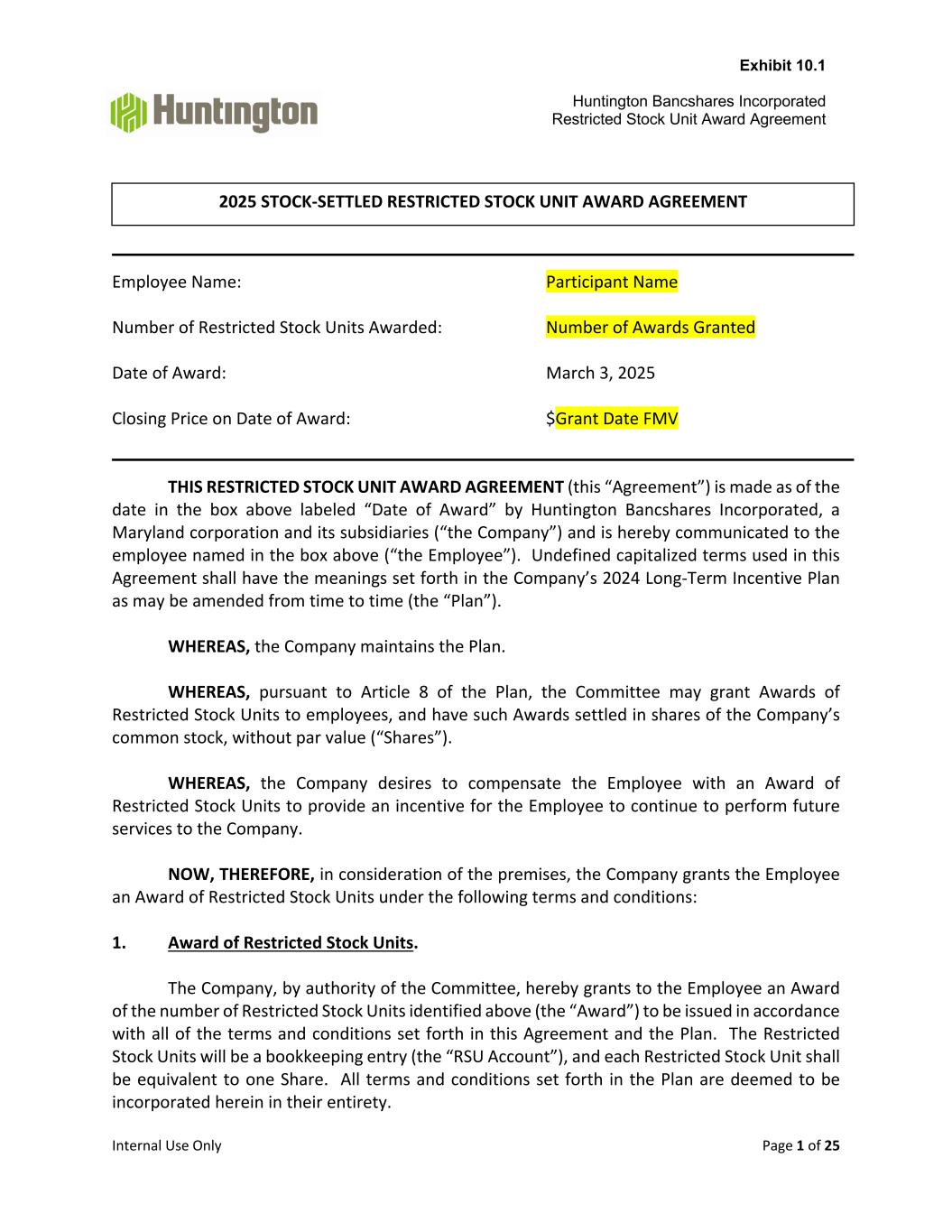
Exhibit 10.1 Huntington Bancshares Incorporated Restricted Stock Unit Award Agreement Internal Use Only Page 1 of 25 Employee Name: Participant Name Number of Restricted Stock Units Awarded: Number of Awards Granted Date of Award: March 3, 2025 Closing Price on Date of Award: $Grant Date FMV THIS RESTRICTED STOCK UNIT AWARD AGREEMENT (this “Agreement”) is made as of the date in the box above labeled “Date of Award” by Huntington Bancshares Incorporated, a Maryland corporation and its subsidiaries (“the Company”) and is hereby communicated to the employee named in the box above (“the Employee”). Undefined capitalized terms used in this Agreement shall have the meanings set forth in the Company’s 2024 Long‐Term Incentive Plan as may be amended from time to time (the “Plan”). WHEREAS, the Company maintains the Plan. WHEREAS, pursuant to Article 8 of the Plan, the Committee may grant Awards of Restricted Stock Units to employees, and have such Awards settled in shares of the Company’s common stock, without par value (“Shares”). WHEREAS, the Company desires to compensate the Employee with an Award of Restricted Stock Units to provide an incentive for the Employee to continue to perform future services to the Company. NOW, THEREFORE, in consideration of the premises, the Company grants the Employee an Award of Restricted Stock Units under the following terms and conditions: 1. Award of Restricted Stock Units. The Company, by authority of the Committee, hereby grants to the Employee an Award of the number of Restricted Stock Units identified above (the “Award”) to be issued in accordance with all of the terms and conditions set forth in this Agreement and the Plan. The Restricted Stock Units will be a bookkeeping entry (the “RSU Account”), and each Restricted Stock Unit shall be equivalent to one Share. All terms and conditions set forth in the Plan are deemed to be incorporated herein in their entirety. 2025 STOCK‐SETTLED RESTRICTED STOCK UNIT AWARD AGREEMENT
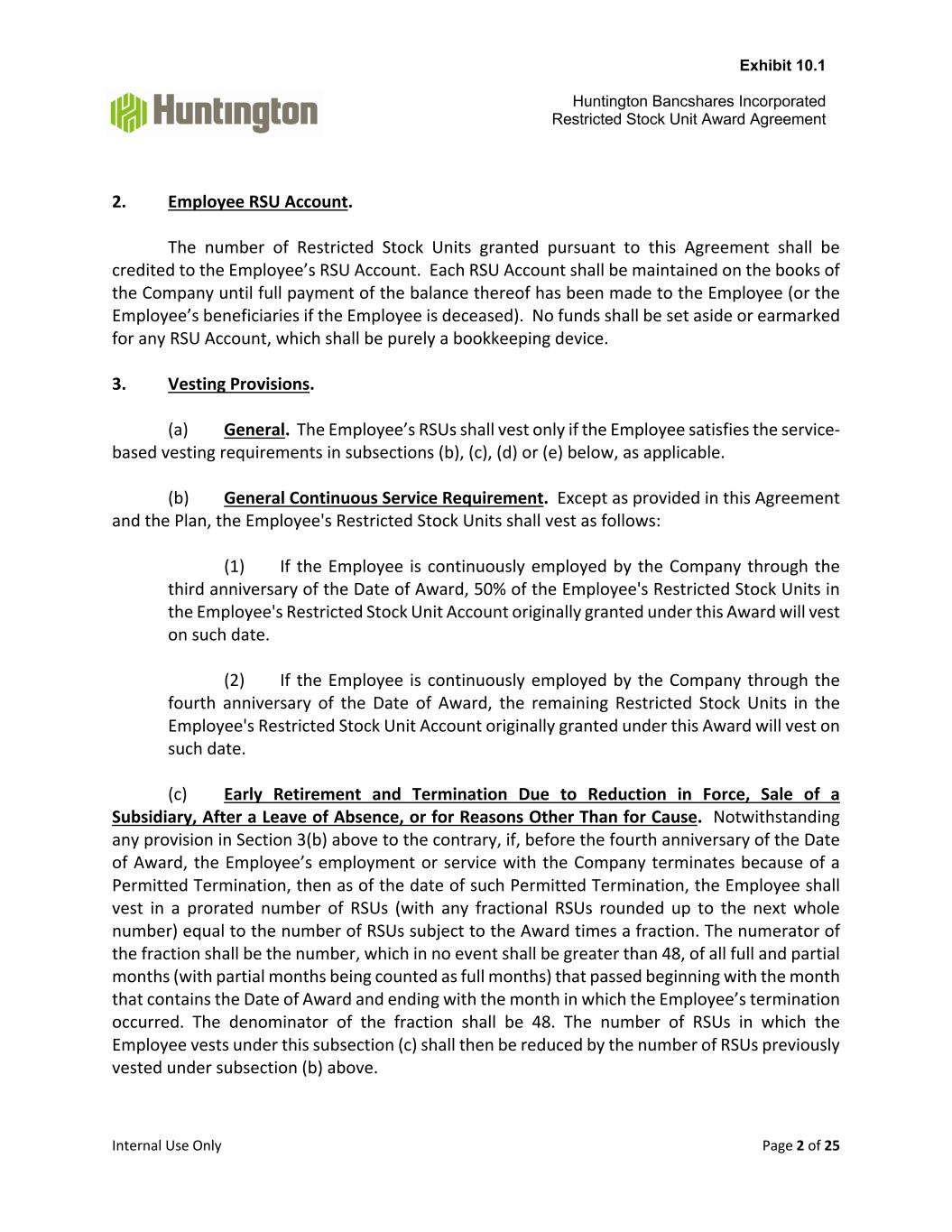
Exhibit 10.1 Huntington Bancshares Incorporated Restricted Stock Unit Award Agreement Internal Use Only Page 2 of 25 2. Employee RSU Account. The number of Restricted Stock Units granted pursuant to this Agreement shall be credited to the Employee’s RSU Account. Each RSU Account shall be maintained on the books of the Company until full payment of the balance thereof has been made to the Employee (or the Employee’s beneficiaries if the Employee is deceased). No funds shall be set aside or earmarked for any RSU Account, which shall be purely a bookkeeping device. 3. Vesting Provisions. (a) General. The Employee’s RSUs shall vest only if the Employee satisfies the service‐ based vesting requirements in subsections (b), (c), (d) or (e) below, as applicable. (b) General Continuous Service Requirement. Except as provided in this Agreement and the Plan, the Employee's Restricted Stock Units shall vest as follows: (1) If the Employee is continuously employed by the Company through the third anniversary of the Date of Award, 50% of the Employee's Restricted Stock Units in the Employee's Restricted Stock Unit Account originally granted under this Award will vest on such date. (2) If the Employee is continuously employed by the Company through the fourth anniversary of the Date of Award, the remaining Restricted Stock Units in the Employee's Restricted Stock Unit Account originally granted under this Award will vest on such date. (c) Early Retirement and Termination Due to Reduction in Force, Sale of a Subsidiary, After a Leave of Absence, or for Reasons Other Than for Cause. Notwithstanding any provision in Section 3(b) above to the contrary, if, before the fourth anniversary of the Date of Award, the Employee’s employment or service with the Company terminates because of a Permitted Termination, then as of the date of such Permitted Termination, the Employee shall vest in a prorated number of RSUs (with any fractional RSUs rounded up to the next whole number) equal to the number of RSUs subject to the Award times a fraction. The numerator of the fraction shall be the number, which in no event shall be greater than 48, of all full and partial months (with partial months being counted as full months) that passed beginning with the month that contains the Date of Award and ending with the month in which the Employee’s termination occurred. The denominator of the fraction shall be 48. The number of RSUs in which the Employee vests under this subsection (c) shall then be reduced by the number of RSUs previously vested under subsection (b) above.
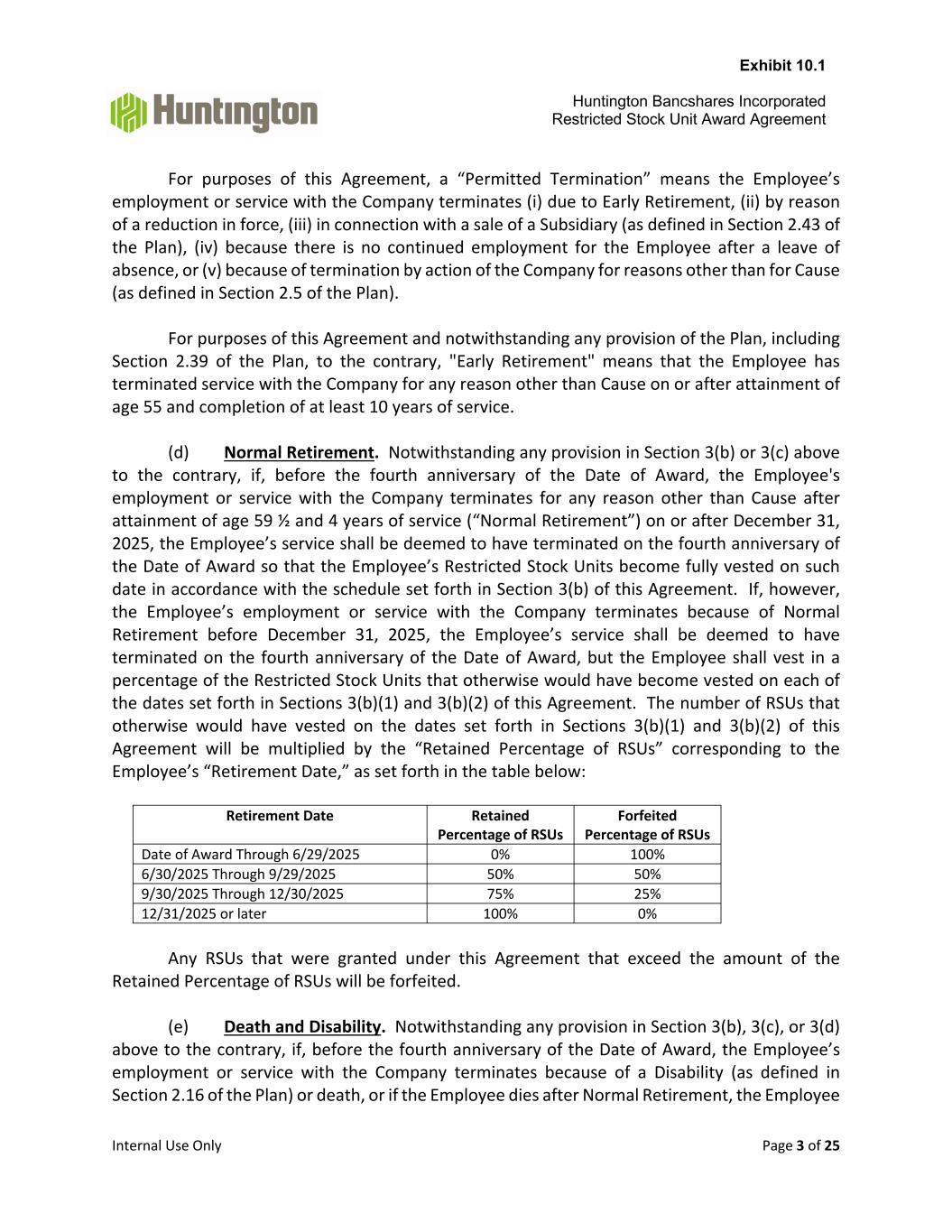
Exhibit 10.1 Huntington Bancshares Incorporated Restricted Stock Unit Award Agreement Internal Use Only Page 3 of 25 For purposes of this Agreement, a “Permitted Termination” means the Employee’s employment or service with the Company terminates (i) due to Early Retirement, (ii) by reason of a reduction in force, (iii) in connection with a sale of a Subsidiary (as defined in Section 2.43 of the Plan), (iv) because there is no continued employment for the Employee after a leave of absence, or (v) because of termination by action of the Company for reasons other than for Cause (as defined in Section 2.5 of the Plan). For purposes of this Agreement and notwithstanding any provision of the Plan, including Section 2.39 of the Plan, to the contrary, "Early Retirement" means that the Employee has terminated service with the Company for any reason other than Cause on or after attainment of age 55 and completion of at least 10 years of service. (d) Normal Retirement. Notwithstanding any provision in Section 3(b) or 3(c) above to the contrary, if, before the fourth anniversary of the Date of Award, the Employee's employment or service with the Company terminates for any reason other than Cause after attainment of age 59 ½ and 4 years of service (“Normal Retirement”) on or after December 31, 2025, the Employee’s service shall be deemed to have terminated on the fourth anniversary of the Date of Award so that the Employee’s Restricted Stock Units become fully vested on such date in accordance with the schedule set forth in Section 3(b) of this Agreement. If, however, the Employee’s employment or service with the Company terminates because of Normal Retirement before December 31, 2025, the Employee’s service shall be deemed to have terminated on the fourth anniversary of the Date of Award, but the Employee shall vest in a percentage of the Restricted Stock Units that otherwise would have become vested on each of the dates set forth in Sections 3(b)(1) and 3(b)(2) of this Agreement. The number of RSUs that otherwise would have vested on the dates set forth in Sections 3(b)(1) and 3(b)(2) of this Agreement will be multiplied by the “Retained Percentage of RSUs” corresponding to the Employee’s “Retirement Date,” as set forth in the table below: Retirement Date Retained Percentage of RSUs Forfeited Percentage of RSUs Date of Award Through 6/29/2025 0% 100% 6/30/2025 Through 9/29/2025 50% 50% 9/30/2025 Through 12/30/2025 75% 25% 12/31/2025 or later 100% 0% Any RSUs that were granted under this Agreement that exceed the amount of the Retained Percentage of RSUs will be forfeited. (e) Death and Disability. Notwithstanding any provision in Section 3(b), 3(c), or 3(d) above to the contrary, if, before the fourth anniversary of the Date of Award, the Employee’s employment or service with the Company terminates because of a Disability (as defined in Section 2.16 of the Plan) or death, or if the Employee dies after Normal Retirement, the Employee
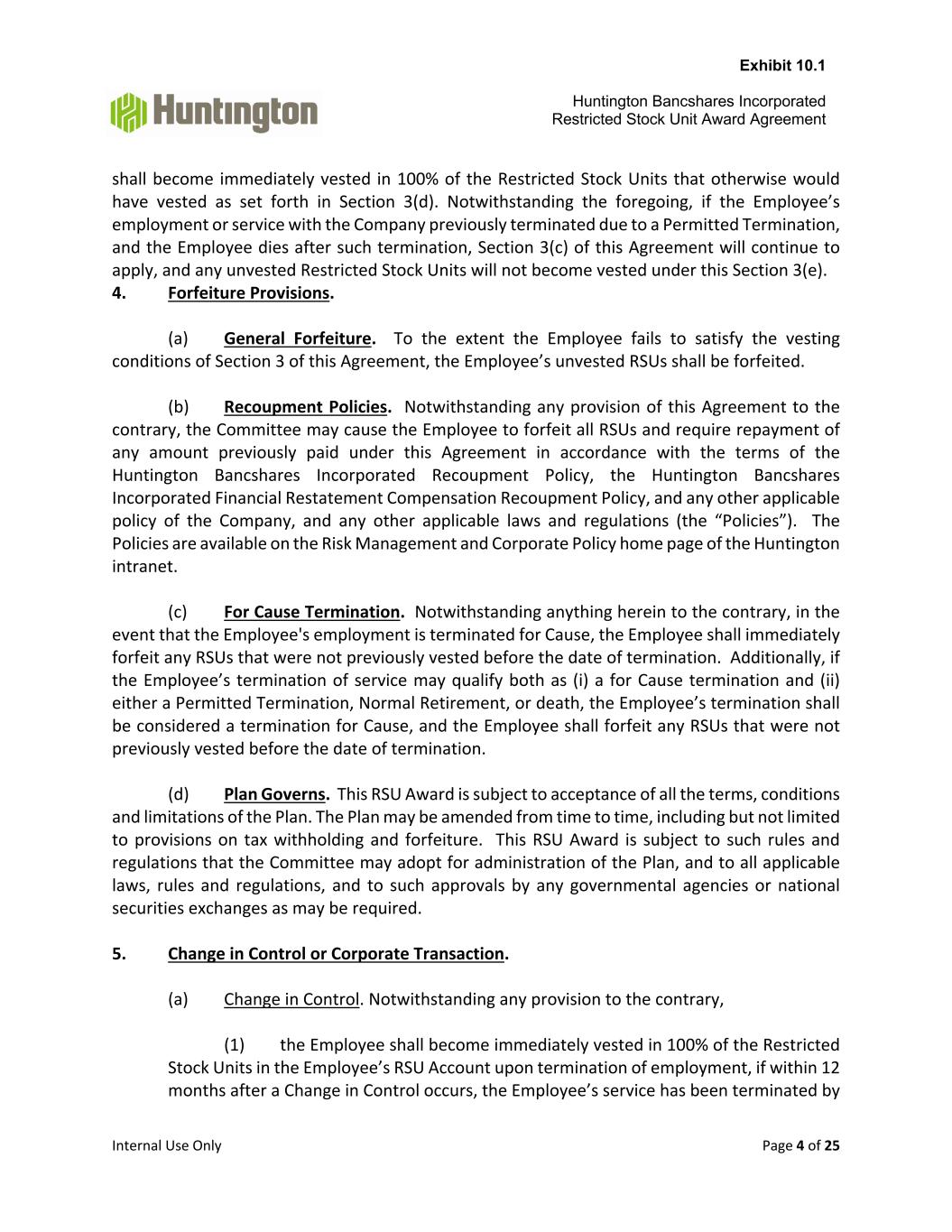
Exhibit 10.1 Huntington Bancshares Incorporated Restricted Stock Unit Award Agreement Internal Use Only Page 4 of 25 shall become immediately vested in 100% of the Restricted Stock Units that otherwise would have vested as set forth in Section 3(d). Notwithstanding the foregoing, if the Employee’s employment or service with the Company previously terminated due to a Permitted Termination, and the Employee dies after such termination, Section 3(c) of this Agreement will continue to apply, and any unvested Restricted Stock Units will not become vested under this Section 3(e). 4. Forfeiture Provisions. (a) General Forfeiture. To the extent the Employee fails to satisfy the vesting conditions of Section 3 of this Agreement, the Employee’s unvested RSUs shall be forfeited. (b) Recoupment Policies. Notwithstanding any provision of this Agreement to the contrary, the Committee may cause the Employee to forfeit all RSUs and require repayment of any amount previously paid under this Agreement in accordance with the terms of the Huntington Bancshares Incorporated Recoupment Policy, the Huntington Bancshares Incorporated Financial Restatement Compensation Recoupment Policy, and any other applicable policy of the Company, and any other applicable laws and regulations (the “Policies”). The Policies are available on the Risk Management and Corporate Policy home page of the Huntington intranet. (c) For Cause Termination. Notwithstanding anything herein to the contrary, in the event that the Employee's employment is terminated for Cause, the Employee shall immediately forfeit any RSUs that were not previously vested before the date of termination. Additionally, if the Employee’s termination of service may qualify both as (i) a for Cause termination and (ii) either a Permitted Termination, Normal Retirement, or death, the Employee’s termination shall be considered a termination for Cause, and the Employee shall forfeit any RSUs that were not previously vested before the date of termination. (d) Plan Governs. This RSU Award is subject to acceptance of all the terms, conditions and limitations of the Plan. The Plan may be amended from time to time, including but not limited to provisions on tax withholding and forfeiture. This RSU Award is subject to such rules and regulations that the Committee may adopt for administration of the Plan, and to all applicable laws, rules and regulations, and to such approvals by any governmental agencies or national securities exchanges as may be required. 5. Change in Control or Corporate Transaction. (a) Change in Control. Notwithstanding any provision to the contrary, (1) the Employee shall become immediately vested in 100% of the Restricted Stock Units in the Employee’s RSU Account upon termination of employment, if within 12 months after a Change in Control occurs, the Employee’s service has been terminated by
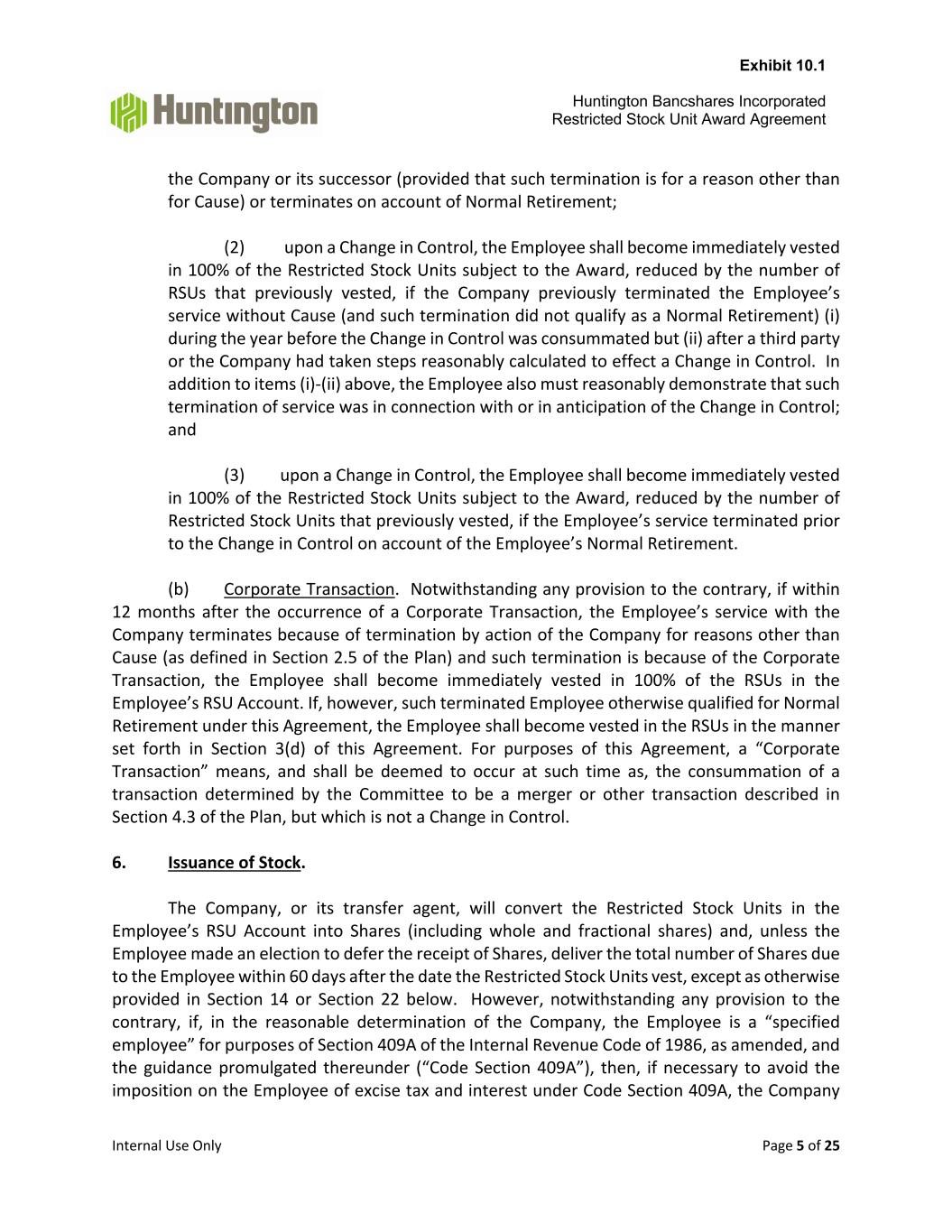
Exhibit 10.1 Huntington Bancshares Incorporated Restricted Stock Unit Award Agreement Internal Use Only Page 5 of 25 the Company or its successor (provided that such termination is for a reason other than for Cause) or terminates on account of Normal Retirement; (2) upon a Change in Control, the Employee shall become immediately vested in 100% of the Restricted Stock Units subject to the Award, reduced by the number of RSUs that previously vested, if the Company previously terminated the Employee’s service without Cause (and such termination did not qualify as a Normal Retirement) (i) during the year before the Change in Control was consummated but (ii) after a third party or the Company had taken steps reasonably calculated to effect a Change in Control. In addition to items (i)‐(ii) above, the Employee also must reasonably demonstrate that such termination of service was in connection with or in anticipation of the Change in Control; and (3) upon a Change in Control, the Employee shall become immediately vested in 100% of the Restricted Stock Units subject to the Award, reduced by the number of Restricted Stock Units that previously vested, if the Employee’s service terminated prior to the Change in Control on account of the Employee’s Normal Retirement. (b) Corporate Transaction. Notwithstanding any provision to the contrary, if within 12 months after the occurrence of a Corporate Transaction, the Employee’s service with the Company terminates because of termination by action of the Company for reasons other than Cause (as defined in Section 2.5 of the Plan) and such termination is because of the Corporate Transaction, the Employee shall become immediately vested in 100% of the RSUs in the Employee’s RSU Account. If, however, such terminated Employee otherwise qualified for Normal Retirement under this Agreement, the Employee shall become vested in the RSUs in the manner set forth in Section 3(d) of this Agreement. For purposes of this Agreement, a “Corporate Transaction” means, and shall be deemed to occur at such time as, the consummation of a transaction determined by the Committee to be a merger or other transaction described in Section 4.3 of the Plan, but which is not a Change in Control. 6. Issuance of Stock. The Company, or its transfer agent, will convert the Restricted Stock Units in the Employee’s RSU Account into Shares (including whole and fractional shares) and, unless the Employee made an election to defer the receipt of Shares, deliver the total number of Shares due to the Employee within 60 days after the date the Restricted Stock Units vest, except as otherwise provided in Section 14 or Section 22 below. However, notwithstanding any provision to the contrary, if, in the reasonable determination of the Company, the Employee is a “specified employee” for purposes of Section 409A of the Internal Revenue Code of 1986, as amended, and the guidance promulgated thereunder (“Code Section 409A”), then, if necessary to avoid the imposition on the Employee of excise tax and interest under Code Section 409A, the Company
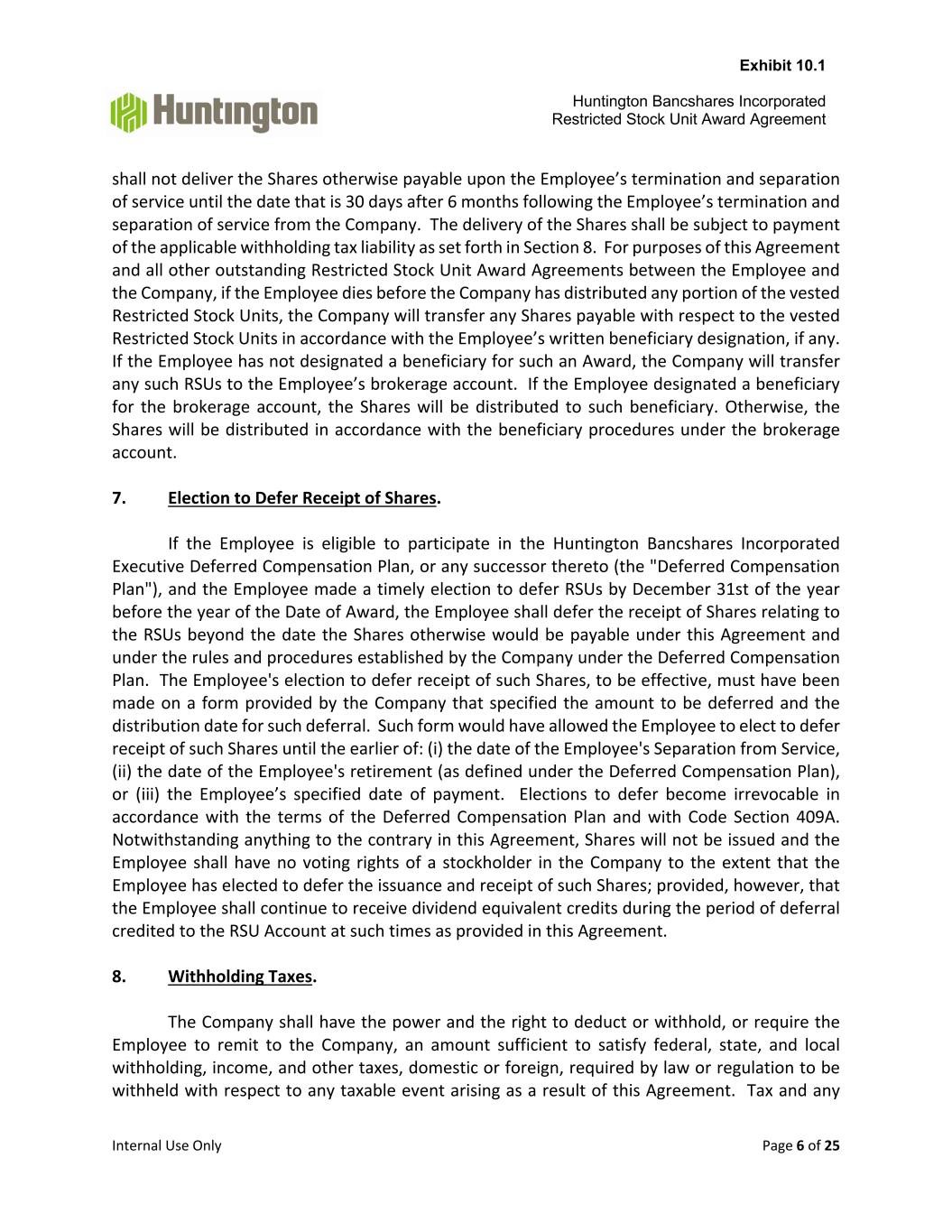
Exhibit 10.1 Huntington Bancshares Incorporated Restricted Stock Unit Award Agreement Internal Use Only Page 6 of 25 shall not deliver the Shares otherwise payable upon the Employee’s termination and separation of service until the date that is 30 days after 6 months following the Employee’s termination and separation of service from the Company. The delivery of the Shares shall be subject to payment of the applicable withholding tax liability as set forth in Section 8. For purposes of this Agreement and all other outstanding Restricted Stock Unit Award Agreements between the Employee and the Company, if the Employee dies before the Company has distributed any portion of the vested Restricted Stock Units, the Company will transfer any Shares payable with respect to the vested Restricted Stock Units in accordance with the Employee’s written beneficiary designation, if any. If the Employee has not designated a beneficiary for such an Award, the Company will transfer any such RSUs to the Employee’s brokerage account. If the Employee designated a beneficiary for the brokerage account, the Shares will be distributed to such beneficiary. Otherwise, the Shares will be distributed in accordance with the beneficiary procedures under the brokerage account. 7. Election to Defer Receipt of Shares. If the Employee is eligible to participate in the Huntington Bancshares Incorporated Executive Deferred Compensation Plan, or any successor thereto (the "Deferred Compensation Plan"), and the Employee made a timely election to defer RSUs by December 31st of the year before the year of the Date of Award, the Employee shall defer the receipt of Shares relating to the RSUs beyond the date the Shares otherwise would be payable under this Agreement and under the rules and procedures established by the Company under the Deferred Compensation Plan. The Employee's election to defer receipt of such Shares, to be effective, must have been made on a form provided by the Company that specified the amount to be deferred and the distribution date for such deferral. Such form would have allowed the Employee to elect to defer receipt of such Shares until the earlier of: (i) the date of the Employee's Separation from Service, (ii) the date of the Employee's retirement (as defined under the Deferred Compensation Plan), or (iii) the Employee’s specified date of payment. Elections to defer become irrevocable in accordance with the terms of the Deferred Compensation Plan and with Code Section 409A. Notwithstanding anything to the contrary in this Agreement, Shares will not be issued and the Employee shall have no voting rights of a stockholder in the Company to the extent that the Employee has elected to defer the issuance and receipt of such Shares; provided, however, that the Employee shall continue to receive dividend equivalent credits during the period of deferral credited to the RSU Account at such times as provided in this Agreement. 8. Withholding Taxes. The Company shall have the power and the right to deduct or withhold, or require the Employee to remit to the Company, an amount sufficient to satisfy federal, state, and local withholding, income, and other taxes, domestic or foreign, required by law or regulation to be withheld with respect to any taxable event arising as a result of this Agreement. Tax and any
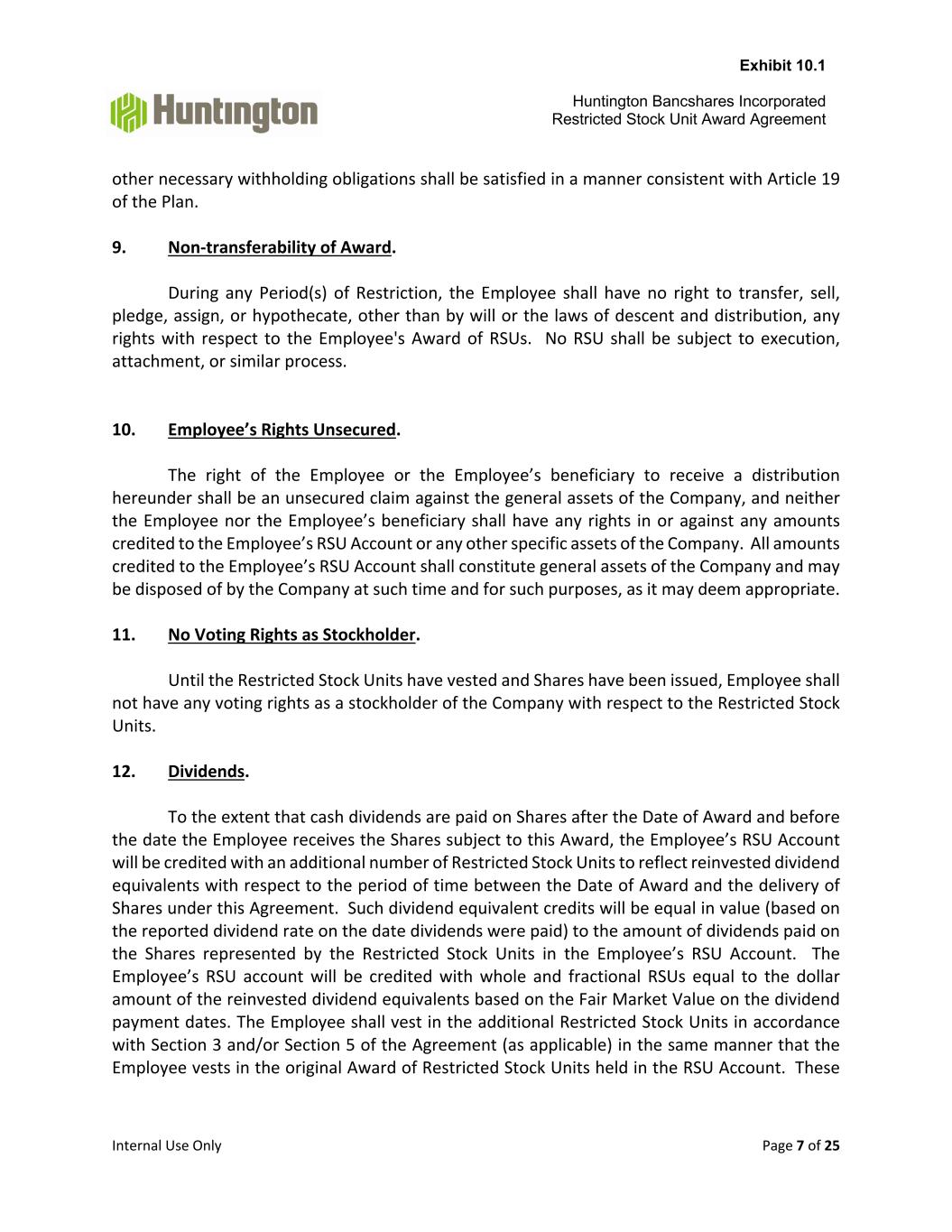
Exhibit 10.1 Huntington Bancshares Incorporated Restricted Stock Unit Award Agreement Internal Use Only Page 7 of 25 other necessary withholding obligations shall be satisfied in a manner consistent with Article 19 of the Plan. 9. Non‐transferability of Award. During any Period(s) of Restriction, the Employee shall have no right to transfer, sell, pledge, assign, or hypothecate, other than by will or the laws of descent and distribution, any rights with respect to the Employee's Award of RSUs. No RSU shall be subject to execution, attachment, or similar process. 10. Employee’s Rights Unsecured. The right of the Employee or the Employee’s beneficiary to receive a distribution hereunder shall be an unsecured claim against the general assets of the Company, and neither the Employee nor the Employee’s beneficiary shall have any rights in or against any amounts credited to the Employee’s RSU Account or any other specific assets of the Company. All amounts credited to the Employee’s RSU Account shall constitute general assets of the Company and may be disposed of by the Company at such time and for such purposes, as it may deem appropriate. 11. No Voting Rights as Stockholder. Until the Restricted Stock Units have vested and Shares have been issued, Employee shall not have any voting rights as a stockholder of the Company with respect to the Restricted Stock Units. 12. Dividends. To the extent that cash dividends are paid on Shares after the Date of Award and before the date the Employee receives the Shares subject to this Award, the Employee’s RSU Account will be credited with an additional number of Restricted Stock Units to reflect reinvested dividend equivalents with respect to the period of time between the Date of Award and the delivery of Shares under this Agreement. Such dividend equivalent credits will be equal in value (based on the reported dividend rate on the date dividends were paid) to the amount of dividends paid on the Shares represented by the Restricted Stock Units in the Employee’s RSU Account. The Employee’s RSU account will be credited with whole and fractional RSUs equal to the dollar amount of the reinvested dividend equivalents based on the Fair Market Value on the dividend payment dates. The Employee shall vest in the additional Restricted Stock Units in accordance with Section 3 and/or Section 5 of the Agreement (as applicable) in the same manner that the Employee vests in the original Award of Restricted Stock Units held in the RSU Account. These
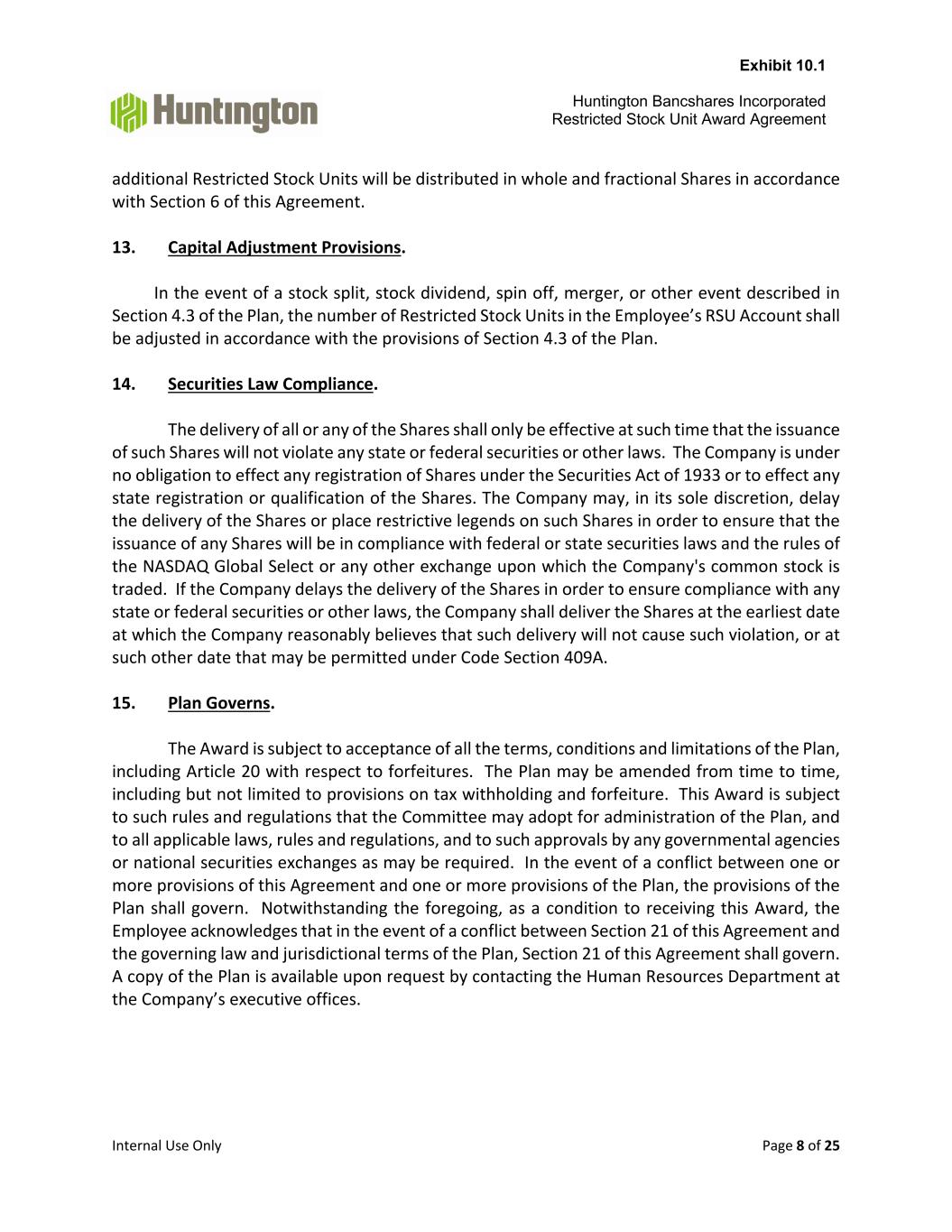
Exhibit 10.1 Huntington Bancshares Incorporated Restricted Stock Unit Award Agreement Internal Use Only Page 8 of 25 additional Restricted Stock Units will be distributed in whole and fractional Shares in accordance with Section 6 of this Agreement. 13. Capital Adjustment Provisions. In the event of a stock split, stock dividend, spin off, merger, or other event described in Section 4.3 of the Plan, the number of Restricted Stock Units in the Employee’s RSU Account shall be adjusted in accordance with the provisions of Section 4.3 of the Plan. 14. Securities Law Compliance. The delivery of all or any of the Shares shall only be effective at such time that the issuance of such Shares will not violate any state or federal securities or other laws. The Company is under no obligation to effect any registration of Shares under the Securities Act of 1933 or to effect any state registration or qualification of the Shares. The Company may, in its sole discretion, delay the delivery of the Shares or place restrictive legends on such Shares in order to ensure that the issuance of any Shares will be in compliance with federal or state securities laws and the rules of the NASDAQ Global Select or any other exchange upon which the Company's common stock is traded. If the Company delays the delivery of the Shares in order to ensure compliance with any state or federal securities or other laws, the Company shall deliver the Shares at the earliest date at which the Company reasonably believes that such delivery will not cause such violation, or at such other date that may be permitted under Code Section 409A. 15. Plan Governs. The Award is subject to acceptance of all the terms, conditions and limitations of the Plan, including Article 20 with respect to forfeitures. The Plan may be amended from time to time, including but not limited to provisions on tax withholding and forfeiture. This Award is subject to such rules and regulations that the Committee may adopt for administration of the Plan, and to all applicable laws, rules and regulations, and to such approvals by any governmental agencies or national securities exchanges as may be required. In the event of a conflict between one or more provisions of this Agreement and one or more provisions of the Plan, the provisions of the Plan shall govern. Notwithstanding the foregoing, as a condition to receiving this Award, the Employee acknowledges that in the event of a conflict between Section 21 of this Agreement and the governing law and jurisdictional terms of the Plan, Section 21 of this Agreement shall govern. A copy of the Plan is available upon request by contacting the Human Resources Department at the Company’s executive offices.
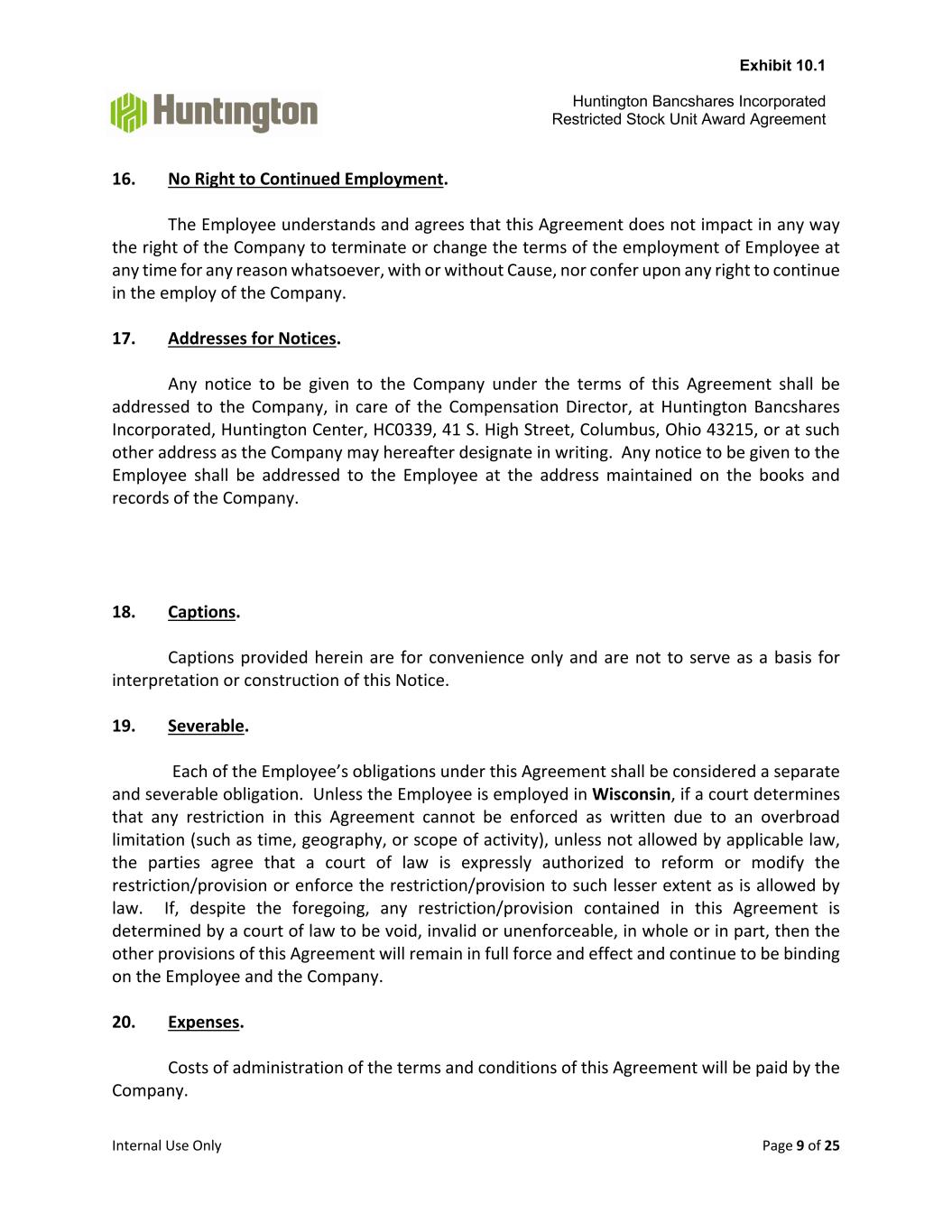
Exhibit 10.1 Huntington Bancshares Incorporated Restricted Stock Unit Award Agreement Internal Use Only Page 9 of 25 16. No Right to Continued Employment. The Employee understands and agrees that this Agreement does not impact in any way the right of the Company to terminate or change the terms of the employment of Employee at any time for any reason whatsoever, with or without Cause, nor confer upon any right to continue in the employ of the Company. 17. Addresses for Notices. Any notice to be given to the Company under the terms of this Agreement shall be addressed to the Company, in care of the Compensation Director, at Huntington Bancshares Incorporated, Huntington Center, HC0339, 41 S. High Street, Columbus, Ohio 43215, or at such other address as the Company may hereafter designate in writing. Any notice to be given to the Employee shall be addressed to the Employee at the address maintained on the books and records of the Company. 18. Captions. Captions provided herein are for convenience only and are not to serve as a basis for interpretation or construction of this Notice. 19. Severable. Each of the Employee’s obligations under this Agreement shall be considered a separate and severable obligation. Unless the Employee is employed in Wisconsin, if a court determines that any restriction in this Agreement cannot be enforced as written due to an overbroad limitation (such as time, geography, or scope of activity), unless not allowed by applicable law, the parties agree that a court of law is expressly authorized to reform or modify the restriction/provision or enforce the restriction/provision to such lesser extent as is allowed by law. If, despite the foregoing, any restriction/provision contained in this Agreement is determined by a court of law to be void, invalid or unenforceable, in whole or in part, then the other provisions of this Agreement will remain in full force and effect and continue to be binding on the Employee and the Company. 20. Expenses. Costs of administration of the terms and conditions of this Agreement will be paid by the Company.
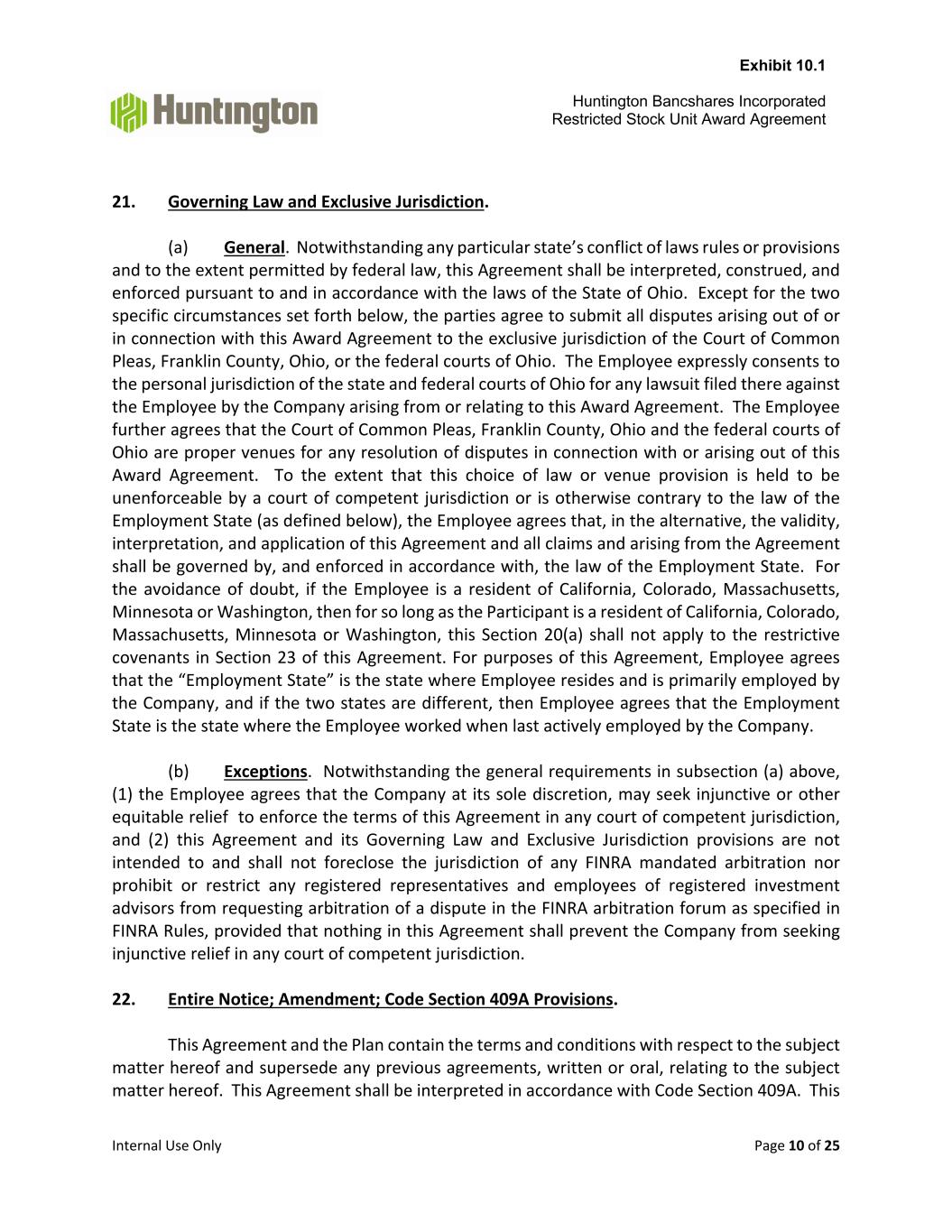
Exhibit 10.1 Huntington Bancshares Incorporated Restricted Stock Unit Award Agreement Internal Use Only Page 10 of 25 21. Governing Law and Exclusive Jurisdiction. (a) General. Notwithstanding any particular state’s conflict of laws rules or provisions and to the extent permitted by federal law, this Agreement shall be interpreted, construed, and enforced pursuant to and in accordance with the laws of the State of Ohio. Except for the two specific circumstances set forth below, the parties agree to submit all disputes arising out of or in connection with this Award Agreement to the exclusive jurisdiction of the Court of Common Pleas, Franklin County, Ohio, or the federal courts of Ohio. The Employee expressly consents to the personal jurisdiction of the state and federal courts of Ohio for any lawsuit filed there against the Employee by the Company arising from or relating to this Award Agreement. The Employee further agrees that the Court of Common Pleas, Franklin County, Ohio and the federal courts of Ohio are proper venues for any resolution of disputes in connection with or arising out of this Award Agreement. To the extent that this choice of law or venue provision is held to be unenforceable by a court of competent jurisdiction or is otherwise contrary to the law of the Employment State (as defined below), the Employee agrees that, in the alternative, the validity, interpretation, and application of this Agreement and all claims and arising from the Agreement shall be governed by, and enforced in accordance with, the law of the Employment State. For the avoidance of doubt, if the Employee is a resident of California, Colorado, Massachusetts, Minnesota or Washington, then for so long as the Participant is a resident of California, Colorado, Massachusetts, Minnesota or Washington, this Section 20(a) shall not apply to the restrictive covenants in Section 23 of this Agreement. For purposes of this Agreement, Employee agrees that the “Employment State” is the state where Employee resides and is primarily employed by the Company, and if the two states are different, then Employee agrees that the Employment State is the state where the Employee worked when last actively employed by the Company. (b) Exceptions. Notwithstanding the general requirements in subsection (a) above, (1) the Employee agrees that the Company at its sole discretion, may seek injunctive or other equitable relief to enforce the terms of this Agreement in any court of competent jurisdiction, and (2) this Agreement and its Governing Law and Exclusive Jurisdiction provisions are not intended to and shall not foreclose the jurisdiction of any FINRA mandated arbitration nor prohibit or restrict any registered representatives and employees of registered investment advisors from requesting arbitration of a dispute in the FINRA arbitration forum as specified in FINRA Rules, provided that nothing in this Agreement shall prevent the Company from seeking injunctive relief in any court of competent jurisdiction. 22. Entire Notice; Amendment; Code Section 409A Provisions. This Agreement and the Plan contain the terms and conditions with respect to the subject matter hereof and supersede any previous agreements, written or oral, relating to the subject matter hereof. This Agreement shall be interpreted in accordance with Code Section 409A. This
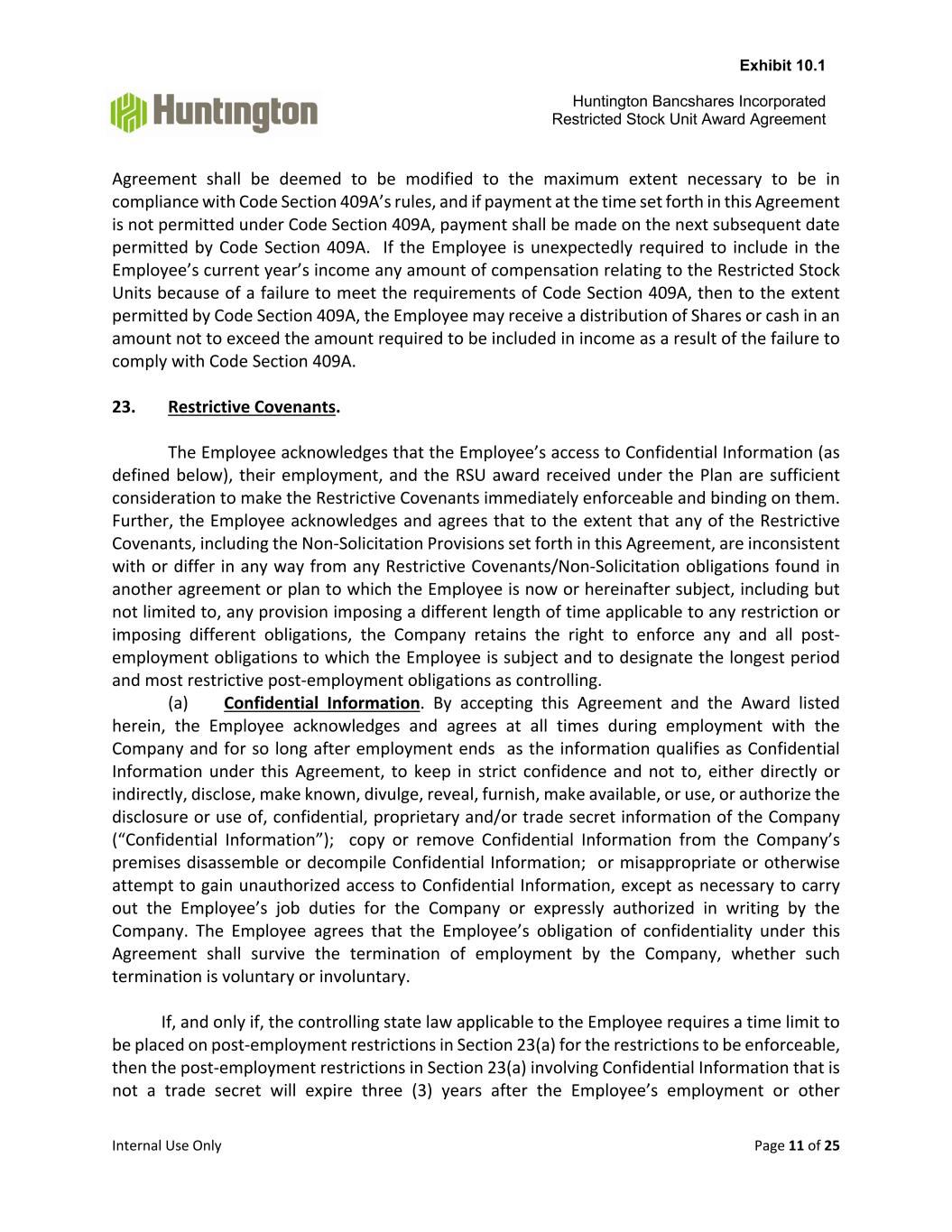
Exhibit 10.1 Huntington Bancshares Incorporated Restricted Stock Unit Award Agreement Internal Use Only Page 11 of 25 Agreement shall be deemed to be modified to the maximum extent necessary to be in compliance with Code Section 409A’s rules, and if payment at the time set forth in this Agreement is not permitted under Code Section 409A, payment shall be made on the next subsequent date permitted by Code Section 409A. If the Employee is unexpectedly required to include in the Employee’s current year’s income any amount of compensation relating to the Restricted Stock Units because of a failure to meet the requirements of Code Section 409A, then to the extent permitted by Code Section 409A, the Employee may receive a distribution of Shares or cash in an amount not to exceed the amount required to be included in income as a result of the failure to comply with Code Section 409A. 23. Restrictive Covenants. The Employee acknowledges that the Employee’s access to Confidential Information (as defined below), their employment, and the RSU award received under the Plan are sufficient consideration to make the Restrictive Covenants immediately enforceable and binding on them. Further, the Employee acknowledges and agrees that to the extent that any of the Restrictive Covenants, including the Non‐Solicitation Provisions set forth in this Agreement, are inconsistent with or differ in any way from any Restrictive Covenants/Non‐Solicitation obligations found in another agreement or plan to which the Employee is now or hereinafter subject, including but not limited to, any provision imposing a different length of time applicable to any restriction or imposing different obligations, the Company retains the right to enforce any and all post‐ employment obligations to which the Employee is subject and to designate the longest period and most restrictive post‐employment obligations as controlling. (a) Confidential Information. By accepting this Agreement and the Award listed herein, the Employee acknowledges and agrees at all times during employment with the Company and for so long after employment ends as the information qualifies as Confidential Information under this Agreement, to keep in strict confidence and not to, either directly or indirectly, disclose, make known, divulge, reveal, furnish, make available, or use, or authorize the disclosure or use of, confidential, proprietary and/or trade secret information of the Company (“Confidential Information”); copy or remove Confidential Information from the Company’s premises disassemble or decompile Confidential Information; or misappropriate or otherwise attempt to gain unauthorized access to Confidential Information, except as necessary to carry out the Employee’s job duties for the Company or expressly authorized in writing by the Company. The Employee agrees that the Employee’s obligation of confidentiality under this Agreement shall survive the termination of employment by the Company, whether such termination is voluntary or involuntary. If, and only if, the controlling state law applicable to the Employee requires a time limit to be placed on post‐employment restrictions in Section 23(a) for the restrictions to be enforceable, then the post‐employment restrictions in Section 23(a) involving Confidential Information that is not a trade secret will expire three (3) years after the Employee’s employment or other
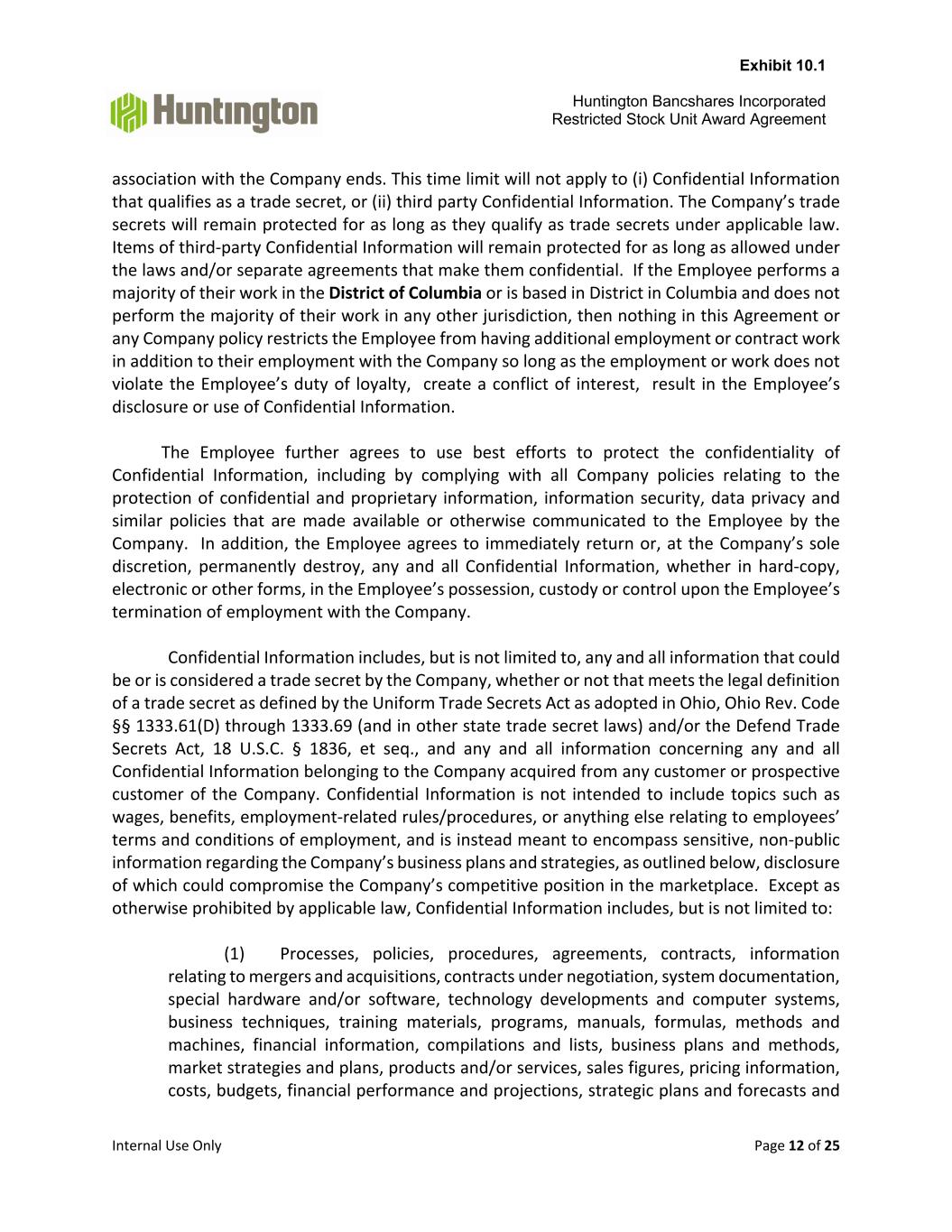
Exhibit 10.1 Huntington Bancshares Incorporated Restricted Stock Unit Award Agreement Internal Use Only Page 12 of 25 association with the Company ends. This time limit will not apply to (i) Confidential Information that qualifies as a trade secret, or (ii) third party Confidential Information. The Company’s trade secrets will remain protected for as long as they qualify as trade secrets under applicable law. Items of third‐party Confidential Information will remain protected for as long as allowed under the laws and/or separate agreements that make them confidential. If the Employee performs a majority of their work in the District of Columbia or is based in District in Columbia and does not perform the majority of their work in any other jurisdiction, then nothing in this Agreement or any Company policy restricts the Employee from having additional employment or contract work in addition to their employment with the Company so long as the employment or work does not violate the Employee’s duty of loyalty, create a conflict of interest, result in the Employee’s disclosure or use of Confidential Information. The Employee further agrees to use best efforts to protect the confidentiality of Confidential Information, including by complying with all Company policies relating to the protection of confidential and proprietary information, information security, data privacy and similar policies that are made available or otherwise communicated to the Employee by the Company. In addition, the Employee agrees to immediately return or, at the Company’s sole discretion, permanently destroy, any and all Confidential Information, whether in hard‐copy, electronic or other forms, in the Employee’s possession, custody or control upon the Employee’s termination of employment with the Company. Confidential Information includes, but is not limited to, any and all information that could be or is considered a trade secret by the Company, whether or not that meets the legal definition of a trade secret as defined by the Uniform Trade Secrets Act as adopted in Ohio, Ohio Rev. Code §§ 1333.61(D) through 1333.69 (and in other state trade secret laws) and/or the Defend Trade Secrets Act, 18 U.S.C. § 1836, et seq., and any and all information concerning any and all Confidential Information belonging to the Company acquired from any customer or prospective customer of the Company. Confidential Information is not intended to include topics such as wages, benefits, employment‐related rules/procedures, or anything else relating to employees’ terms and conditions of employment, and is instead meant to encompass sensitive, non‐public information regarding the Company’s business plans and strategies, as outlined below, disclosure of which could compromise the Company’s competitive position in the marketplace. Except as otherwise prohibited by applicable law, Confidential Information includes, but is not limited to: (1) Processes, policies, procedures, agreements, contracts, information relating to mergers and acquisitions, contracts under negotiation, system documentation, special hardware and/or software, technology developments and computer systems, business techniques, training materials, programs, manuals, formulas, methods and machines, financial information, compilations and lists, business plans and methods, market strategies and plans, products and/or services, sales figures, pricing information, costs, budgets, financial performance and projections, strategic plans and forecasts and
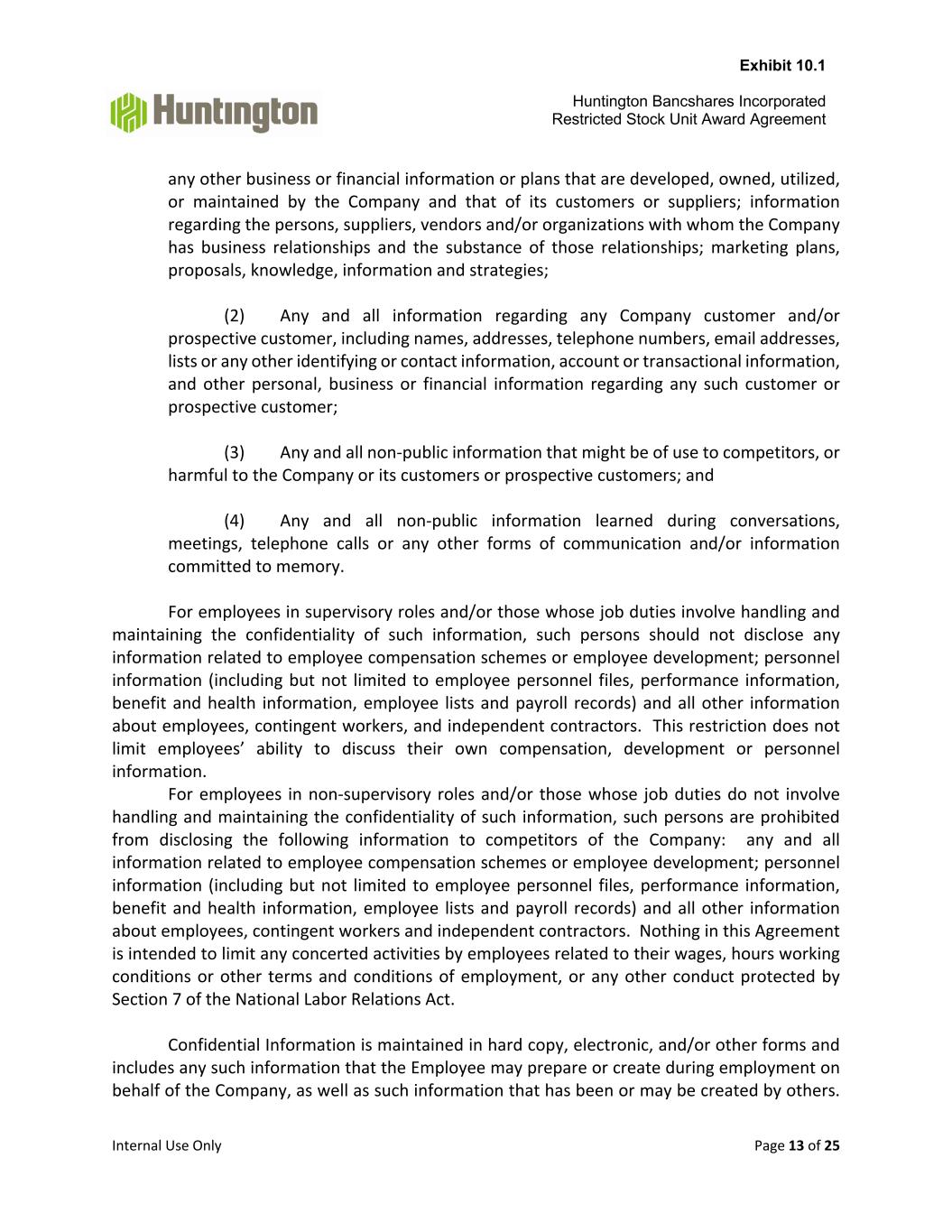
Exhibit 10.1 Huntington Bancshares Incorporated Restricted Stock Unit Award Agreement Internal Use Only Page 13 of 25 any other business or financial information or plans that are developed, owned, utilized, or maintained by the Company and that of its customers or suppliers; information regarding the persons, suppliers, vendors and/or organizations with whom the Company has business relationships and the substance of those relationships; marketing plans, proposals, knowledge, information and strategies; (2) Any and all information regarding any Company customer and/or prospective customer, including names, addresses, telephone numbers, email addresses, lists or any other identifying or contact information, account or transactional information, and other personal, business or financial information regarding any such customer or prospective customer; (3) Any and all non‐public information that might be of use to competitors, or harmful to the Company or its customers or prospective customers; and (4) Any and all non‐public information learned during conversations, meetings, telephone calls or any other forms of communication and/or information committed to memory. For employees in supervisory roles and/or those whose job duties involve handling and maintaining the confidentiality of such information, such persons should not disclose any information related to employee compensation schemes or employee development; personnel information (including but not limited to employee personnel files, performance information, benefit and health information, employee lists and payroll records) and all other information about employees, contingent workers, and independent contractors. This restriction does not limit employees’ ability to discuss their own compensation, development or personnel information. For employees in non‐supervisory roles and/or those whose job duties do not involve handling and maintaining the confidentiality of such information, such persons are prohibited from disclosing the following information to competitors of the Company: any and all information related to employee compensation schemes or employee development; personnel information (including but not limited to employee personnel files, performance information, benefit and health information, employee lists and payroll records) and all other information about employees, contingent workers and independent contractors. Nothing in this Agreement is intended to limit any concerted activities by employees related to their wages, hours working conditions or other terms and conditions of employment, or any other conduct protected by Section 7 of the National Labor Relations Act. Confidential Information is maintained in hard copy, electronic, and/or other forms and includes any such information that the Employee may prepare or create during employment on behalf of the Company, as well as such information that has been or may be created by others.
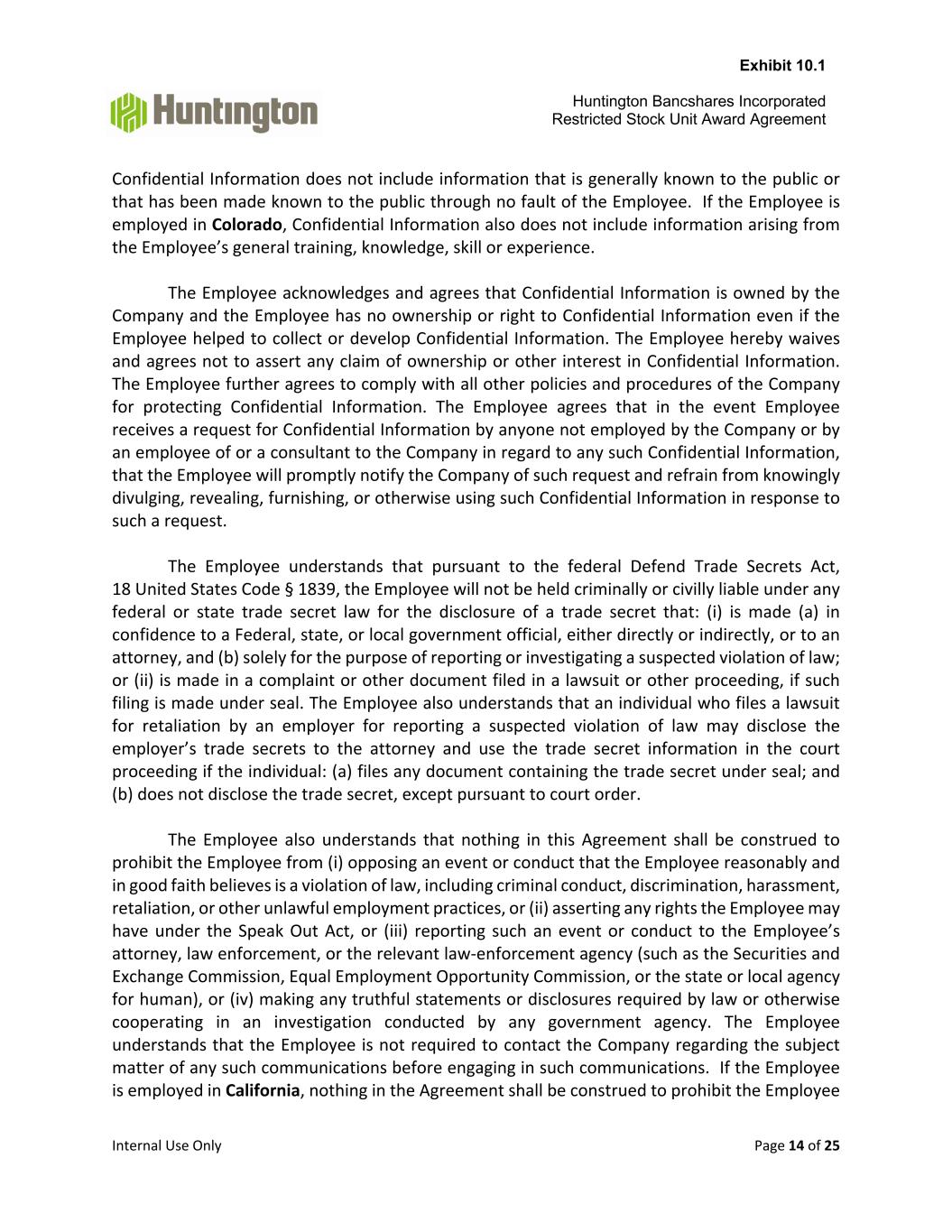
Exhibit 10.1 Huntington Bancshares Incorporated Restricted Stock Unit Award Agreement Internal Use Only Page 14 of 25 Confidential Information does not include information that is generally known to the public or that has been made known to the public through no fault of the Employee. If the Employee is employed in Colorado, Confidential Information also does not include information arising from the Employee’s general training, knowledge, skill or experience. The Employee acknowledges and agrees that Confidential Information is owned by the Company and the Employee has no ownership or right to Confidential Information even if the Employee helped to collect or develop Confidential Information. The Employee hereby waives and agrees not to assert any claim of ownership or other interest in Confidential Information. The Employee further agrees to comply with all other policies and procedures of the Company for protecting Confidential Information. The Employee agrees that in the event Employee receives a request for Confidential Information by anyone not employed by the Company or by an employee of or a consultant to the Company in regard to any such Confidential Information, that the Employee will promptly notify the Company of such request and refrain from knowingly divulging, revealing, furnishing, or otherwise using such Confidential Information in response to such a request. The Employee understands that pursuant to the federal Defend Trade Secrets Act, 18 United States Code § 1839, the Employee will not be held criminally or civilly liable under any federal or state trade secret law for the disclosure of a trade secret that: (i) is made (a) in confidence to a Federal, state, or local government official, either directly or indirectly, or to an attorney, and (b) solely for the purpose of reporting or investigating a suspected violation of law; or (ii) is made in a complaint or other document filed in a lawsuit or other proceeding, if such filing is made under seal. The Employee also understands that an individual who files a lawsuit for retaliation by an employer for reporting a suspected violation of law may disclose the employer’s trade secrets to the attorney and use the trade secret information in the court proceeding if the individual: (a) files any document containing the trade secret under seal; and (b) does not disclose the trade secret, except pursuant to court order. The Employee also understands that nothing in this Agreement shall be construed to prohibit the Employee from (i) opposing an event or conduct that the Employee reasonably and in good faith believes is a violation of law, including criminal conduct, discrimination, harassment, retaliation, or other unlawful employment practices, or (ii) asserting any rights the Employee may have under the Speak Out Act, or (iii) reporting such an event or conduct to the Employee’s attorney, law enforcement, or the relevant law‐enforcement agency (such as the Securities and Exchange Commission, Equal Employment Opportunity Commission, or the state or local agency for human), or (iv) making any truthful statements or disclosures required by law or otherwise cooperating in an investigation conducted by any government agency. The Employee understands that the Employee is not required to contact the Company regarding the subject matter of any such communications before engaging in such communications. If the Employee is employed in California, nothing in the Agreement shall be construed to prohibit the Employee
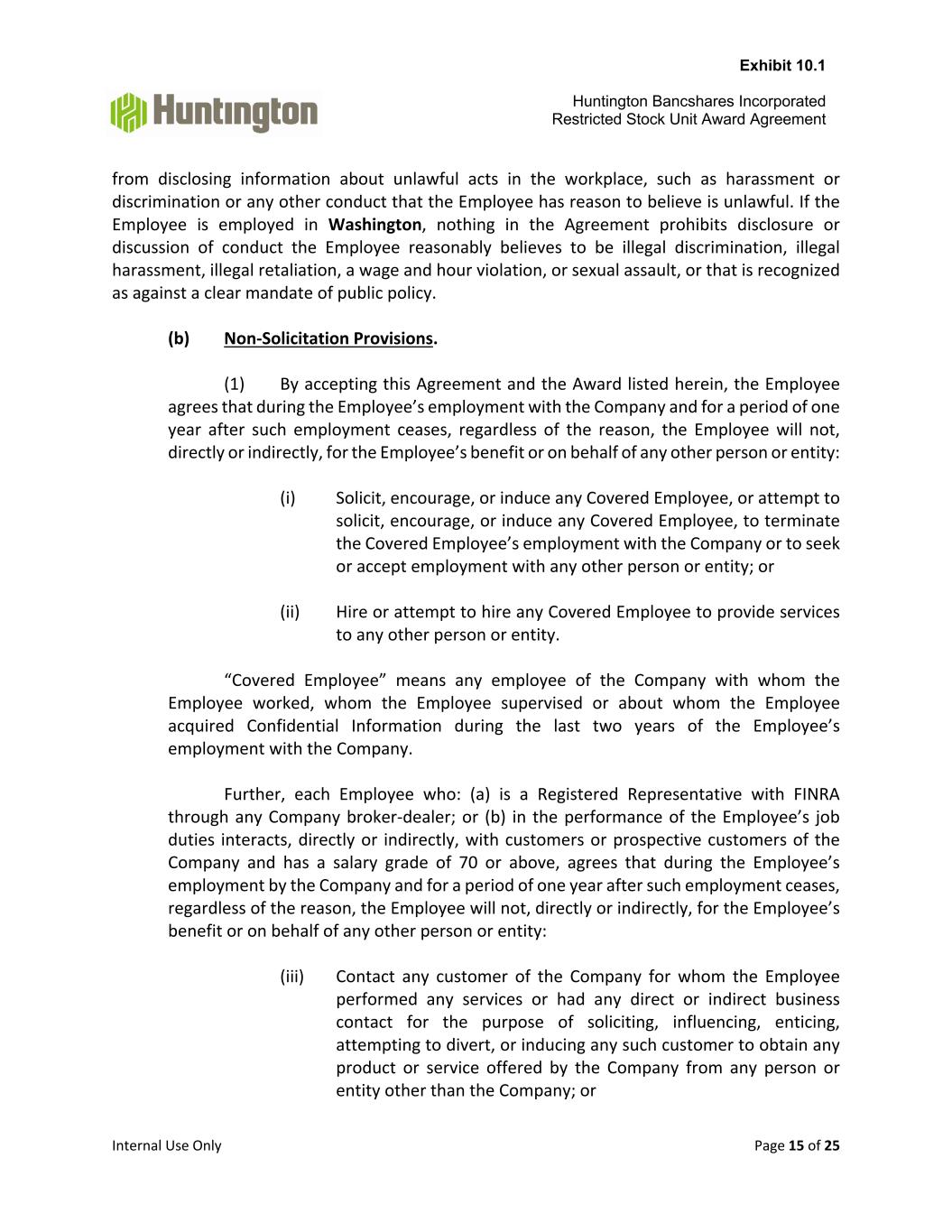
Exhibit 10.1 Huntington Bancshares Incorporated Restricted Stock Unit Award Agreement Internal Use Only Page 15 of 25 from disclosing information about unlawful acts in the workplace, such as harassment or discrimination or any other conduct that the Employee has reason to believe is unlawful. If the Employee is employed in Washington, nothing in the Agreement prohibits disclosure or discussion of conduct the Employee reasonably believes to be illegal discrimination, illegal harassment, illegal retaliation, a wage and hour violation, or sexual assault, or that is recognized as against a clear mandate of public policy. (b) Non‐Solicitation Provisions. (1) By accepting this Agreement and the Award listed herein, the Employee agrees that during the Employee’s employment with the Company and for a period of one year after such employment ceases, regardless of the reason, the Employee will not, directly or indirectly, for the Employee’s benefit or on behalf of any other person or entity: (i) Solicit, encourage, or induce any Covered Employee, or attempt to solicit, encourage, or induce any Covered Employee, to terminate the Covered Employee’s employment with the Company or to seek or accept employment with any other person or entity; or (ii) Hire or attempt to hire any Covered Employee to provide services to any other person or entity. “Covered Employee” means any employee of the Company with whom the Employee worked, whom the Employee supervised or about whom the Employee acquired Confidential Information during the last two years of the Employee’s employment with the Company. Further, each Employee who: (a) is a Registered Representative with FINRA through any Company broker‐dealer; or (b) in the performance of the Employee’s job duties interacts, directly or indirectly, with customers or prospective customers of the Company and has a salary grade of 70 or above, agrees that during the Employee’s employment by the Company and for a period of one year after such employment ceases, regardless of the reason, the Employee will not, directly or indirectly, for the Employee’s benefit or on behalf of any other person or entity: (iii) Contact any customer of the Company for whom the Employee performed any services or had any direct or indirect business contact for the purpose of soliciting, influencing, enticing, attempting to divert, or inducing any such customer to obtain any product or service offered by the Company from any person or entity other than the Company; or
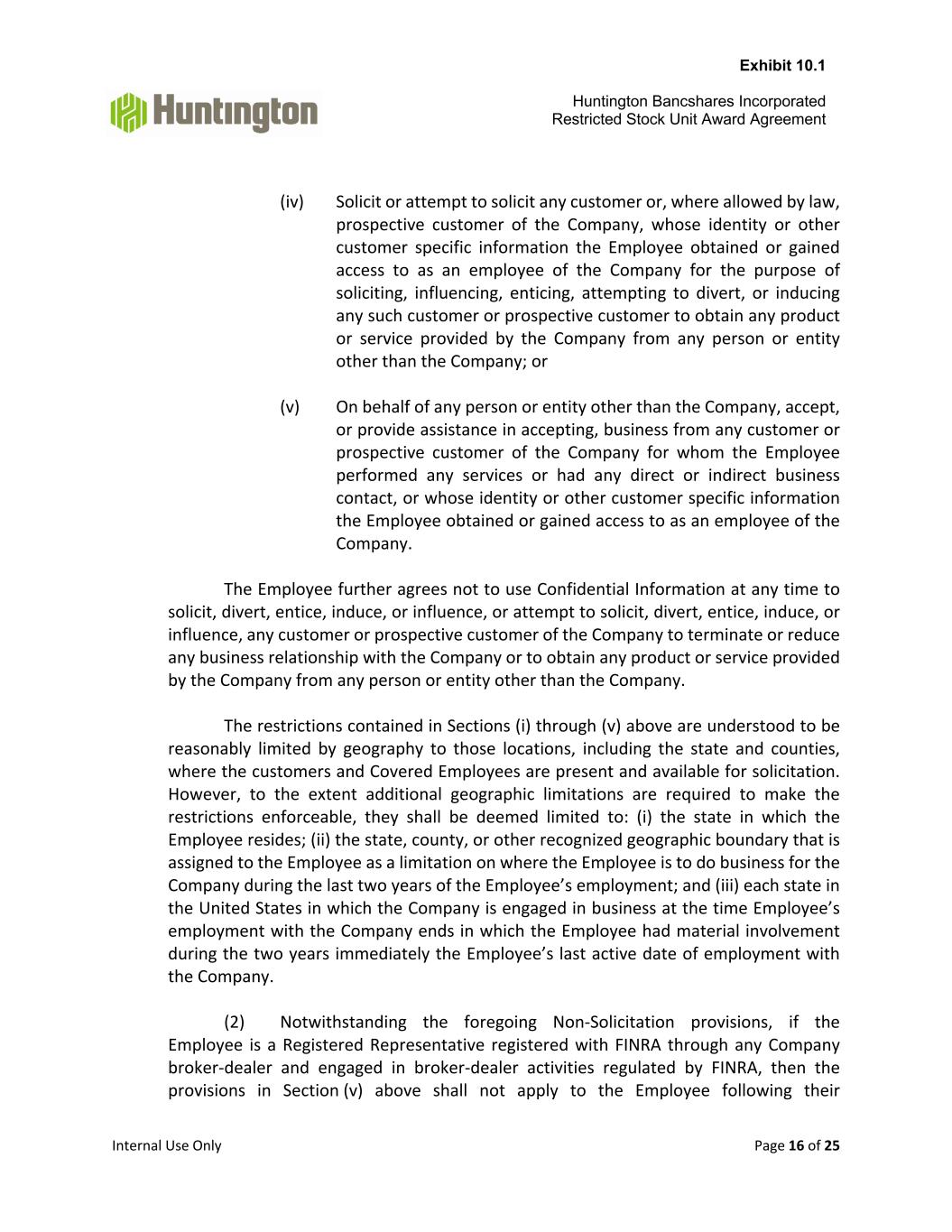
Exhibit 10.1 Huntington Bancshares Incorporated Restricted Stock Unit Award Agreement Internal Use Only Page 16 of 25 (iv) Solicit or attempt to solicit any customer or, where allowed by law, prospective customer of the Company, whose identity or other customer specific information the Employee obtained or gained access to as an employee of the Company for the purpose of soliciting, influencing, enticing, attempting to divert, or inducing any such customer or prospective customer to obtain any product or service provided by the Company from any person or entity other than the Company; or (v) On behalf of any person or entity other than the Company, accept, or provide assistance in accepting, business from any customer or prospective customer of the Company for whom the Employee performed any services or had any direct or indirect business contact, or whose identity or other customer specific information the Employee obtained or gained access to as an employee of the Company. The Employee further agrees not to use Confidential Information at any time to solicit, divert, entice, induce, or influence, or attempt to solicit, divert, entice, induce, or influence, any customer or prospective customer of the Company to terminate or reduce any business relationship with the Company or to obtain any product or service provided by the Company from any person or entity other than the Company. The restrictions contained in Sections (i) through (v) above are understood to be reasonably limited by geography to those locations, including the state and counties, where the customers and Covered Employees are present and available for solicitation. However, to the extent additional geographic limitations are required to make the restrictions enforceable, they shall be deemed limited to: (i) the state in which the Employee resides; (ii) the state, county, or other recognized geographic boundary that is assigned to the Employee as a limitation on where the Employee is to do business for the Company during the last two years of the Employee’s employment; and (iii) each state in the United States in which the Company is engaged in business at the time Employee’s employment with the Company ends in which the Employee had material involvement during the two years immediately the Employee’s last active date of employment with the Company. (2) Notwithstanding the foregoing Non‐Solicitation provisions, if the Employee is a Registered Representative registered with FINRA through any Company broker‐dealer and engaged in broker‐dealer activities regulated by FINRA, then the provisions in Section (v) above shall not apply to the Employee following their
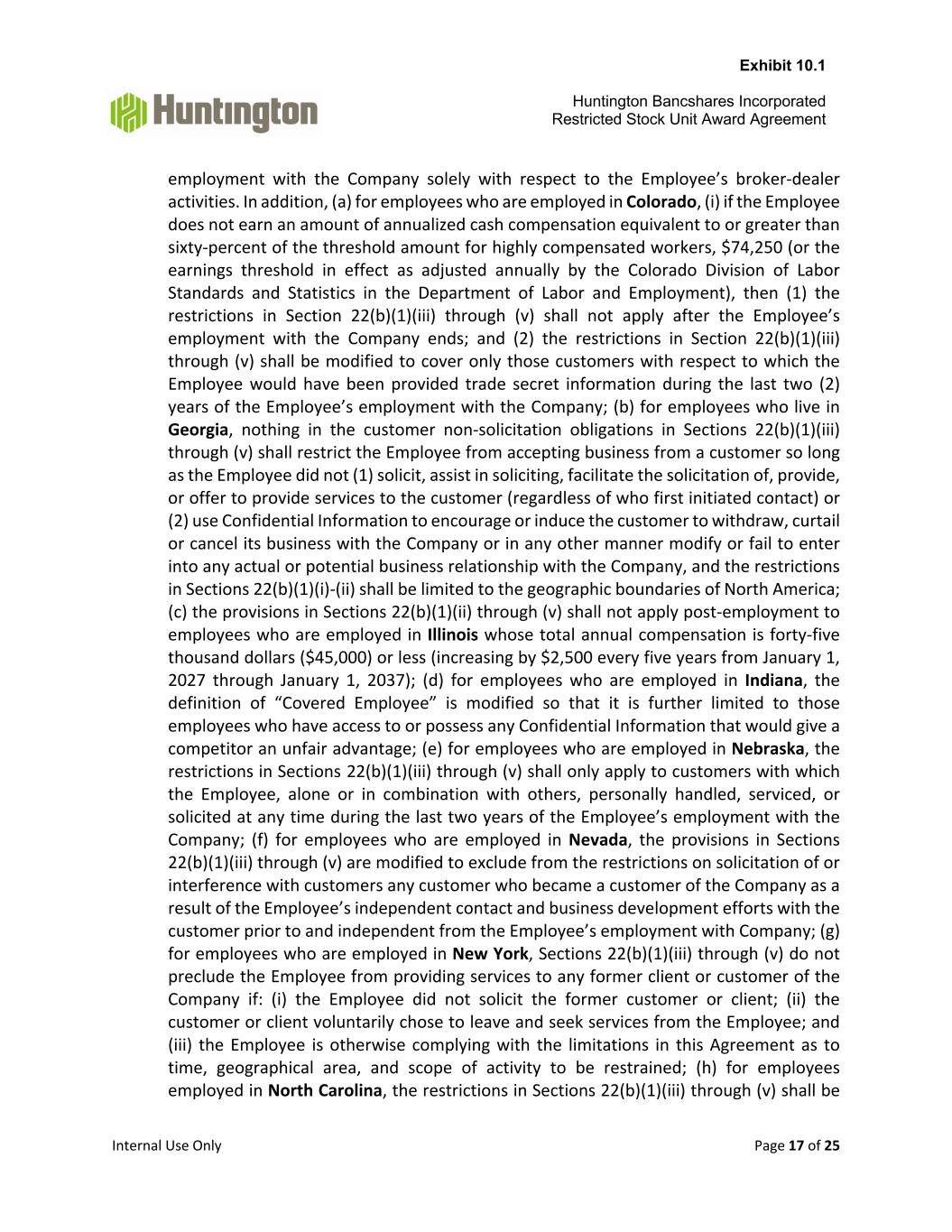
Exhibit 10.1 Huntington Bancshares Incorporated Restricted Stock Unit Award Agreement Internal Use Only Page 17 of 25 employment with the Company solely with respect to the Employee’s broker‐dealer activities. In addition, (a) for employees who are employed in Colorado, (i) if the Employee does not earn an amount of annualized cash compensation equivalent to or greater than sixty‐percent of the threshold amount for highly compensated workers, $74,250 (or the earnings threshold in effect as adjusted annually by the Colorado Division of Labor Standards and Statistics in the Department of Labor and Employment), then (1) the restrictions in Section 22(b)(1)(iii) through (v) shall not apply after the Employee’s employment with the Company ends; and (2) the restrictions in Section 22(b)(1)(iii) through (v) shall be modified to cover only those customers with respect to which the Employee would have been provided trade secret information during the last two (2) years of the Employee’s employment with the Company; (b) for employees who live in Georgia, nothing in the customer non‐solicitation obligations in Sections 22(b)(1)(iii) through (v) shall restrict the Employee from accepting business from a customer so long as the Employee did not (1) solicit, assist in soliciting, facilitate the solicitation of, provide, or offer to provide services to the customer (regardless of who first initiated contact) or (2) use Confidential Information to encourage or induce the customer to withdraw, curtail or cancel its business with the Company or in any other manner modify or fail to enter into any actual or potential business relationship with the Company, and the restrictions in Sections 22(b)(1)(i)‐(ii) shall be limited to the geographic boundaries of North America; (c) the provisions in Sections 22(b)(1)(ii) through (v) shall not apply post‐employment to employees who are employed in Illinois whose total annual compensation is forty‐five thousand dollars ($45,000) or less (increasing by $2,500 every five years from January 1, 2027 through January 1, 2037); (d) for employees who are employed in Indiana, the definition of “Covered Employee” is modified so that it is further limited to those employees who have access to or possess any Confidential Information that would give a competitor an unfair advantage; (e) for employees who are employed in Nebraska, the restrictions in Sections 22(b)(1)(iii) through (v) shall only apply to customers with which the Employee, alone or in combination with others, personally handled, serviced, or solicited at any time during the last two years of the Employee’s employment with the Company; (f) for employees who are employed in Nevada, the provisions in Sections 22(b)(1)(iii) through (v) are modified to exclude from the restrictions on solicitation of or interference with customers any customer who became a customer of the Company as a result of the Employee’s independent contact and business development efforts with the customer prior to and independent from the Employee’s employment with Company; (g) for employees who are employed in New York, Sections 22(b)(1)(iii) through (v) do not preclude the Employee from providing services to any former client or customer of the Company if: (i) the Employee did not solicit the former customer or client; (ii) the customer or client voluntarily chose to leave and seek services from the Employee; and (iii) the Employee is otherwise complying with the limitations in this Agreement as to time, geographical area, and scope of activity to be restrained; (h) for employees employed in North Carolina, the restrictions in Sections 22(b)(1)(iii) through (v) shall be
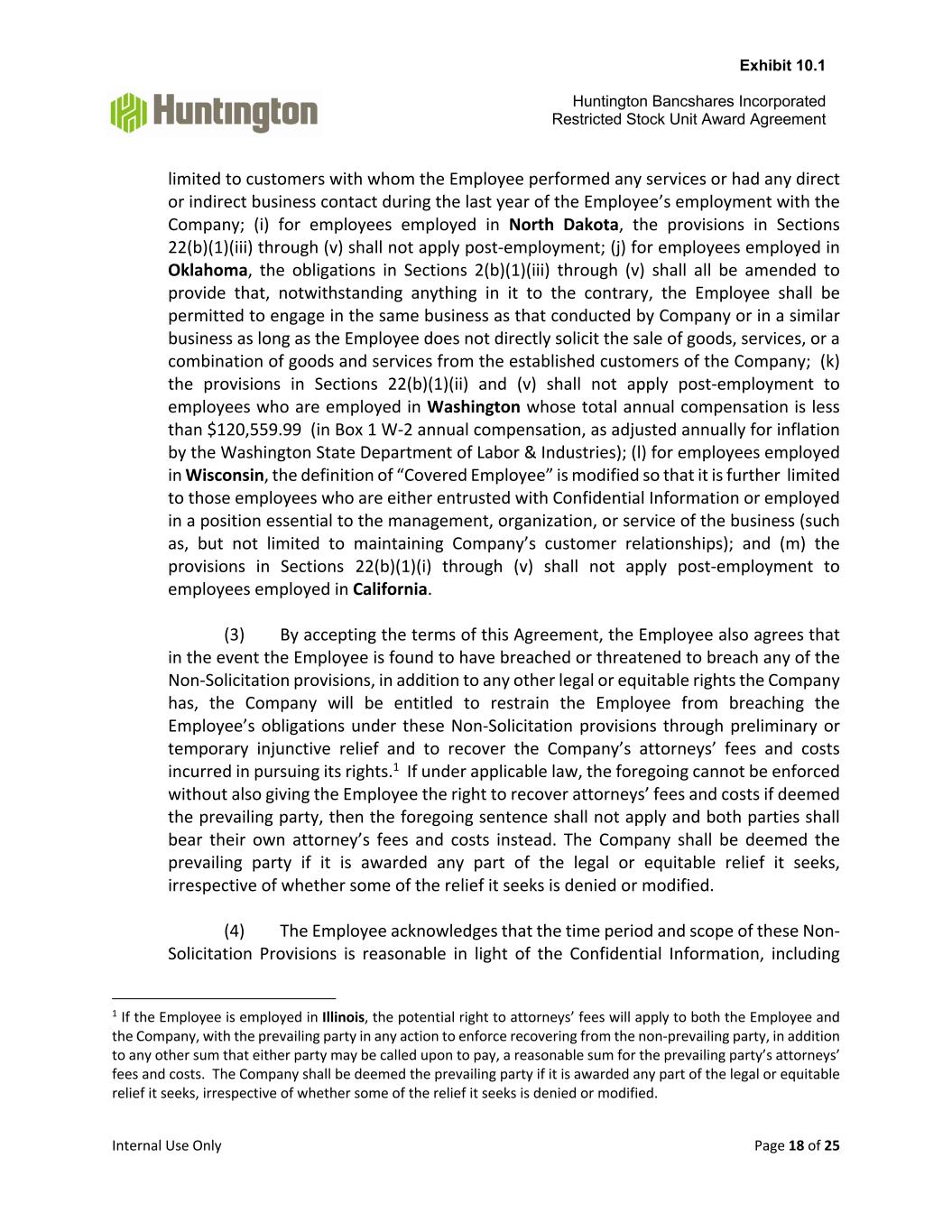
Exhibit 10.1 Huntington Bancshares Incorporated Restricted Stock Unit Award Agreement Internal Use Only Page 18 of 25 limited to customers with whom the Employee performed any services or had any direct or indirect business contact during the last year of the Employee’s employment with the Company; (i) for employees employed in North Dakota, the provisions in Sections 22(b)(1)(iii) through (v) shall not apply post‐employment; (j) for employees employed in Oklahoma, the obligations in Sections 2(b)(1)(iii) through (v) shall all be amended to provide that, notwithstanding anything in it to the contrary, the Employee shall be permitted to engage in the same business as that conducted by Company or in a similar business as long as the Employee does not directly solicit the sale of goods, services, or a combination of goods and services from the established customers of the Company; (k) the provisions in Sections 22(b)(1)(ii) and (v) shall not apply post‐employment to employees who are employed in Washington whose total annual compensation is less than $120,559.99 (in Box 1 W‐2 annual compensation, as adjusted annually for inflation by the Washington State Department of Labor & Industries); (l) for employees employed in Wisconsin, the definition of “Covered Employee” is modified so that it is further limited to those employees who are either entrusted with Confidential Information or employed in a position essential to the management, organization, or service of the business (such as, but not limited to maintaining Company’s customer relationships); and (m) the provisions in Sections 22(b)(1)(i) through (v) shall not apply post‐employment to employees employed in California. (3) By accepting the terms of this Agreement, the Employee also agrees that in the event the Employee is found to have breached or threatened to breach any of the Non‐Solicitation provisions, in addition to any other legal or equitable rights the Company has, the Company will be entitled to restrain the Employee from breaching the Employee’s obligations under these Non‐Solicitation provisions through preliminary or temporary injunctive relief and to recover the Company’s attorneys’ fees and costs incurred in pursuing its rights.1 If under applicable law, the foregoing cannot be enforced without also giving the Employee the right to recover attorneys’ fees and costs if deemed the prevailing party, then the foregoing sentence shall not apply and both parties shall bear their own attorney’s fees and costs instead. The Company shall be deemed the prevailing party if it is awarded any part of the legal or equitable relief it seeks, irrespective of whether some of the relief it seeks is denied or modified. (4) The Employee acknowledges that the time period and scope of these Non‐ Solicitation Provisions is reasonable in light of the Confidential Information, including 1 If the Employee is employed in Illinois, the potential right to attorneys’ fees will apply to both the Employee and the Company, with the prevailing party in any action to enforce recovering from the non‐prevailing party, in addition to any other sum that either party may be called upon to pay, a reasonable sum for the prevailing party’s attorneys’ fees and costs. The Company shall be deemed the prevailing party if it is awarded any part of the legal or equitable relief it seeks, irrespective of whether some of the relief it seeks is denied or modified.
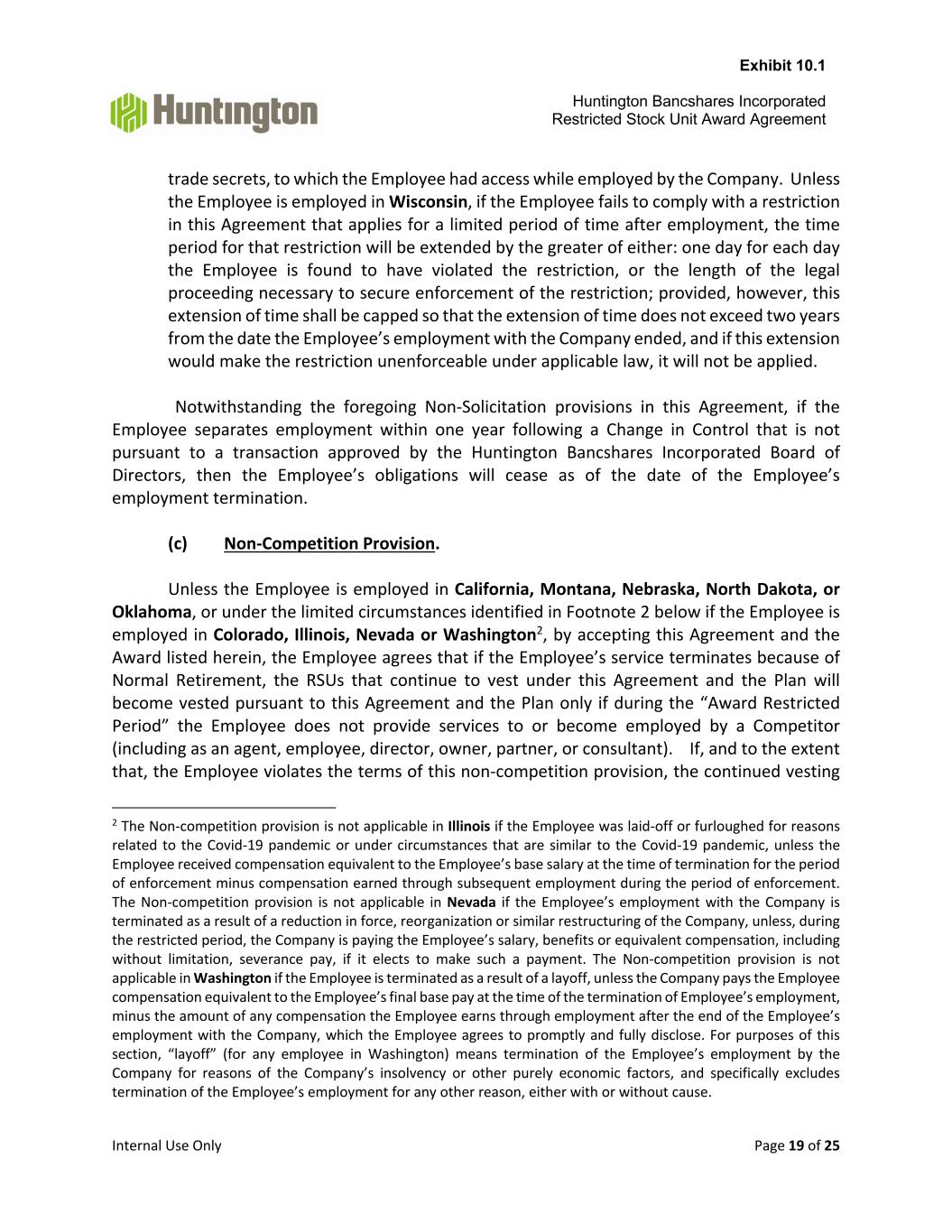
Exhibit 10.1 Huntington Bancshares Incorporated Restricted Stock Unit Award Agreement Internal Use Only Page 19 of 25 trade secrets, to which the Employee had access while employed by the Company. Unless the Employee is employed in Wisconsin, if the Employee fails to comply with a restriction in this Agreement that applies for a limited period of time after employment, the time period for that restriction will be extended by the greater of either: one day for each day the Employee is found to have violated the restriction, or the length of the legal proceeding necessary to secure enforcement of the restriction; provided, however, this extension of time shall be capped so that the extension of time does not exceed two years from the date the Employee’s employment with the Company ended, and if this extension would make the restriction unenforceable under applicable law, it will not be applied. Notwithstanding the foregoing Non‐Solicitation provisions in this Agreement, if the Employee separates employment within one year following a Change in Control that is not pursuant to a transaction approved by the Huntington Bancshares Incorporated Board of Directors, then the Employee’s obligations will cease as of the date of the Employee’s employment termination. (c) Non‐Competition Provision. Unless the Employee is employed in California, Montana, Nebraska, North Dakota, or Oklahoma, or under the limited circumstances identified in Footnote 2 below if the Employee is employed in Colorado, Illinois, Nevada or Washington2, by accepting this Agreement and the Award listed herein, the Employee agrees that if the Employee’s service terminates because of Normal Retirement, the RSUs that continue to vest under this Agreement and the Plan will become vested pursuant to this Agreement and the Plan only if during the “Award Restricted Period” the Employee does not provide services to or become employed by a Competitor (including as an agent, employee, director, owner, partner, or consultant). If, and to the extent that, the Employee violates the terms of this non‐competition provision, the continued vesting 2 The Non‐competition provision is not applicable in Illinois if the Employee was laid‐off or furloughed for reasons related to the Covid‐19 pandemic or under circumstances that are similar to the Covid‐19 pandemic, unless the Employee received compensation equivalent to the Employee’s base salary at the time of termination for the period of enforcement minus compensation earned through subsequent employment during the period of enforcement. The Non‐competition provision is not applicable in Nevada if the Employee’s employment with the Company is terminated as a result of a reduction in force, reorganization or similar restructuring of the Company, unless, during the restricted period, the Company is paying the Employee’s salary, benefits or equivalent compensation, including without limitation, severance pay, if it elects to make such a payment. The Non‐competition provision is not applicable in Washington if the Employee is terminated as a result of a layoff, unless the Company pays the Employee compensation equivalent to the Employee’s final base pay at the time of the termination of Employee’s employment, minus the amount of any compensation the Employee earns through employment after the end of the Employee’s employment with the Company, which the Employee agrees to promptly and fully disclose. For purposes of this section, “layoff” (for any employee in Washington) means termination of the Employee’s employment by the Company for reasons of the Company’s insolvency or other purely economic factors, and specifically excludes termination of the Employee’s employment for any other reason, either with or without cause.
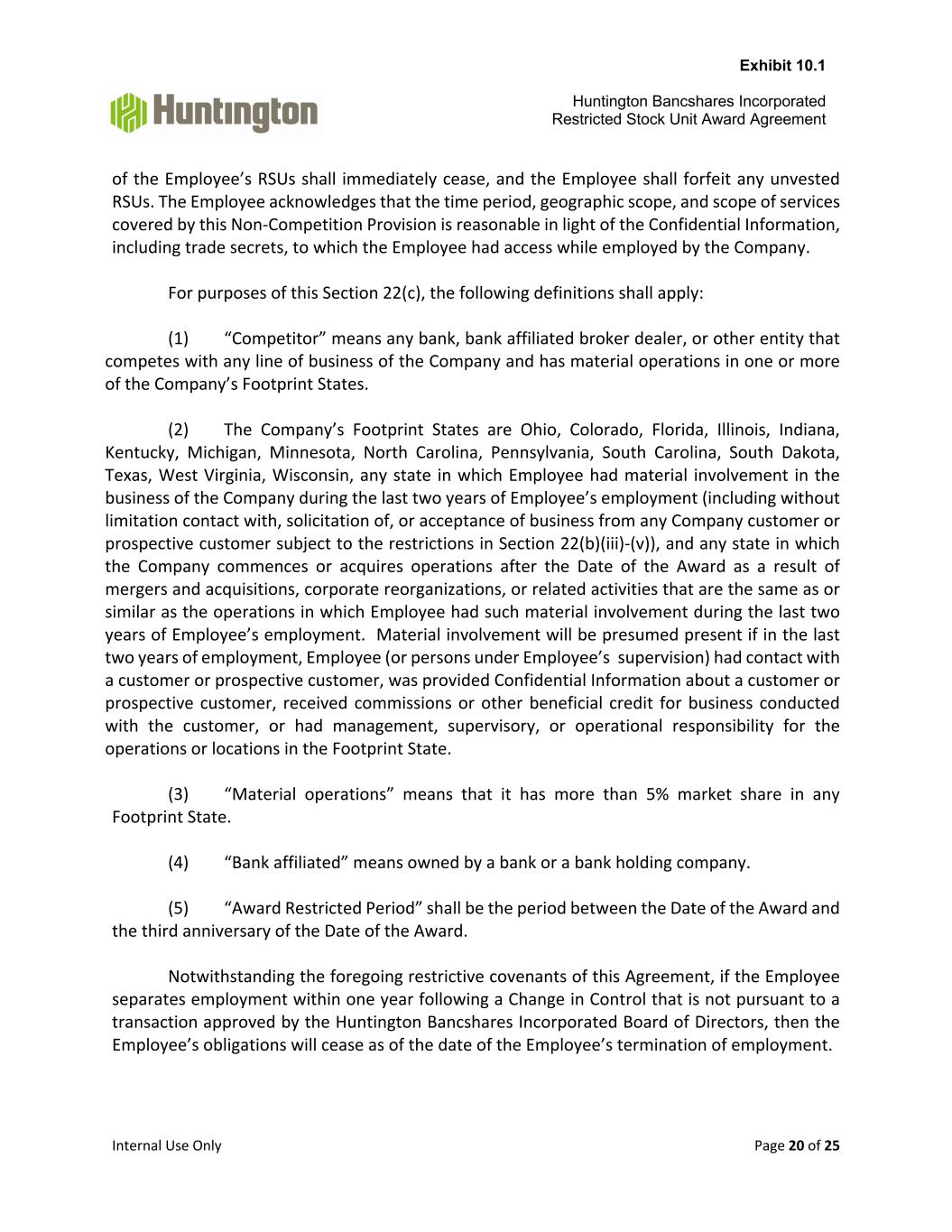
Exhibit 10.1 Huntington Bancshares Incorporated Restricted Stock Unit Award Agreement Internal Use Only Page 20 of 25 of the Employee’s RSUs shall immediately cease, and the Employee shall forfeit any unvested RSUs. The Employee acknowledges that the time period, geographic scope, and scope of services covered by this Non‐Competition Provision is reasonable in light of the Confidential Information, including trade secrets, to which the Employee had access while employed by the Company. For purposes of this Section 22(c), the following definitions shall apply: (1) “Competitor” means any bank, bank affiliated broker dealer, or other entity that competes with any line of business of the Company and has material operations in one or more of the Company’s Footprint States. (2) The Company’s Footprint States are Ohio, Colorado, Florida, Illinois, Indiana, Kentucky, Michigan, Minnesota, North Carolina, Pennsylvania, South Carolina, South Dakota, Texas, West Virginia, Wisconsin, any state in which Employee had material involvement in the business of the Company during the last two years of Employee’s employment (including without limitation contact with, solicitation of, or acceptance of business from any Company customer or prospective customer subject to the restrictions in Section 22(b)(iii)‐(v)), and any state in which the Company commences or acquires operations after the Date of the Award as a result of mergers and acquisitions, corporate reorganizations, or related activities that are the same as or similar as the operations in which Employee had such material involvement during the last two years of Employee’s employment. Material involvement will be presumed present if in the last two years of employment, Employee (or persons under Employee’s supervision) had contact with a customer or prospective customer, was provided Confidential Information about a customer or prospective customer, received commissions or other beneficial credit for business conducted with the customer, or had management, supervisory, or operational responsibility for the operations or locations in the Footprint State. (3) “Material operations” means that it has more than 5% market share in any Footprint State. (4) “Bank affiliated” means owned by a bank or a bank holding company. (5) “Award Restricted Period” shall be the period between the Date of the Award and the third anniversary of the Date of the Award. Notwithstanding the foregoing restrictive covenants of this Agreement, if the Employee separates employment within one year following a Change in Control that is not pursuant to a transaction approved by the Huntington Bancshares Incorporated Board of Directors, then the Employee’s obligations will cease as of the date of the Employee’s termination of employment.
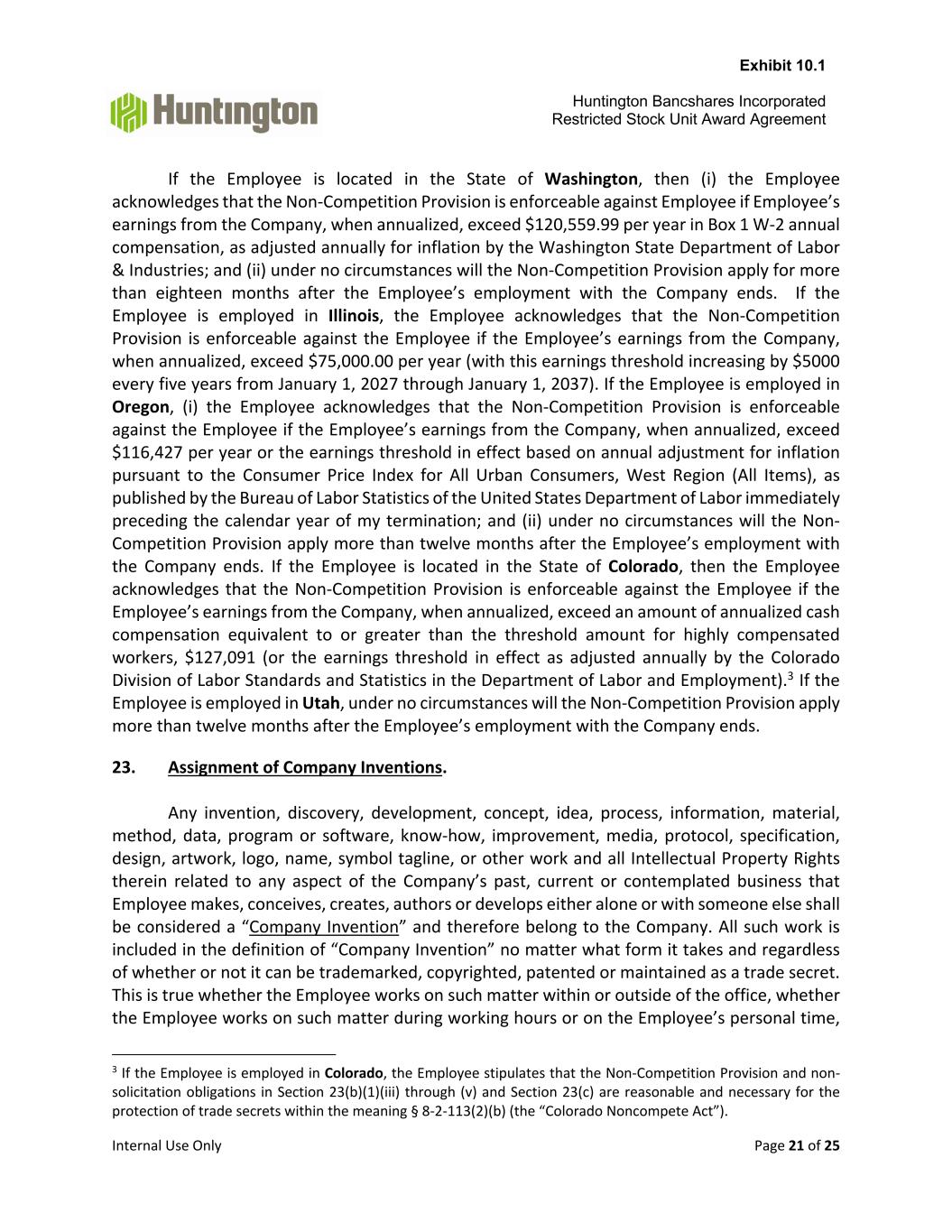
Exhibit 10.1 Huntington Bancshares Incorporated Restricted Stock Unit Award Agreement Internal Use Only Page 21 of 25 If the Employee is located in the State of Washington, then (i) the Employee acknowledges that the Non‐Competition Provision is enforceable against Employee if Employee’s earnings from the Company, when annualized, exceed $120,559.99 per year in Box 1 W‐2 annual compensation, as adjusted annually for inflation by the Washington State Department of Labor & Industries; and (ii) under no circumstances will the Non‐Competition Provision apply for more than eighteen months after the Employee’s employment with the Company ends. If the Employee is employed in Illinois, the Employee acknowledges that the Non‐Competition Provision is enforceable against the Employee if the Employee’s earnings from the Company, when annualized, exceed $75,000.00 per year (with this earnings threshold increasing by $5000 every five years from January 1, 2027 through January 1, 2037). If the Employee is employed in Oregon, (i) the Employee acknowledges that the Non‐Competition Provision is enforceable against the Employee if the Employee’s earnings from the Company, when annualized, exceed $116,427 per year or the earnings threshold in effect based on annual adjustment for inflation pursuant to the Consumer Price Index for All Urban Consumers, West Region (All Items), as published by the Bureau of Labor Statistics of the United States Department of Labor immediately preceding the calendar year of my termination; and (ii) under no circumstances will the Non‐ Competition Provision apply more than twelve months after the Employee’s employment with the Company ends. If the Employee is located in the State of Colorado, then the Employee acknowledges that the Non‐Competition Provision is enforceable against the Employee if the Employee’s earnings from the Company, when annualized, exceed an amount of annualized cash compensation equivalent to or greater than the threshold amount for highly compensated workers, $127,091 (or the earnings threshold in effect as adjusted annually by the Colorado Division of Labor Standards and Statistics in the Department of Labor and Employment).3 If the Employee is employed in Utah, under no circumstances will the Non‐Competition Provision apply more than twelve months after the Employee’s employment with the Company ends. 23. Assignment of Company Inventions. Any invention, discovery, development, concept, idea, process, information, material, method, data, program or software, know‐how, improvement, media, protocol, specification, design, artwork, logo, name, symbol tagline, or other work and all Intellectual Property Rights therein related to any aspect of the Company’s past, current or contemplated business that Employee makes, conceives, creates, authors or develops either alone or with someone else shall be considered a “Company Invention” and therefore belong to the Company. All such work is included in the definition of “Company Invention” no matter what form it takes and regardless of whether or not it can be trademarked, copyrighted, patented or maintained as a trade secret. This is true whether the Employee works on such matter within or outside of the office, whether the Employee works on such matter during working hours or on the Employee’s personal time, 3 If the Employee is employed in Colorado, the Employee stipulates that the Non‐Competition Provision and non‐ solicitation obligations in Section 23(b)(1)(iii) through (v) and Section 23(c) are reasonable and necessary for the protection of trade secrets within the meaning § 8‐2‐113(2)(b) (the “Colorado Noncompete Act”).
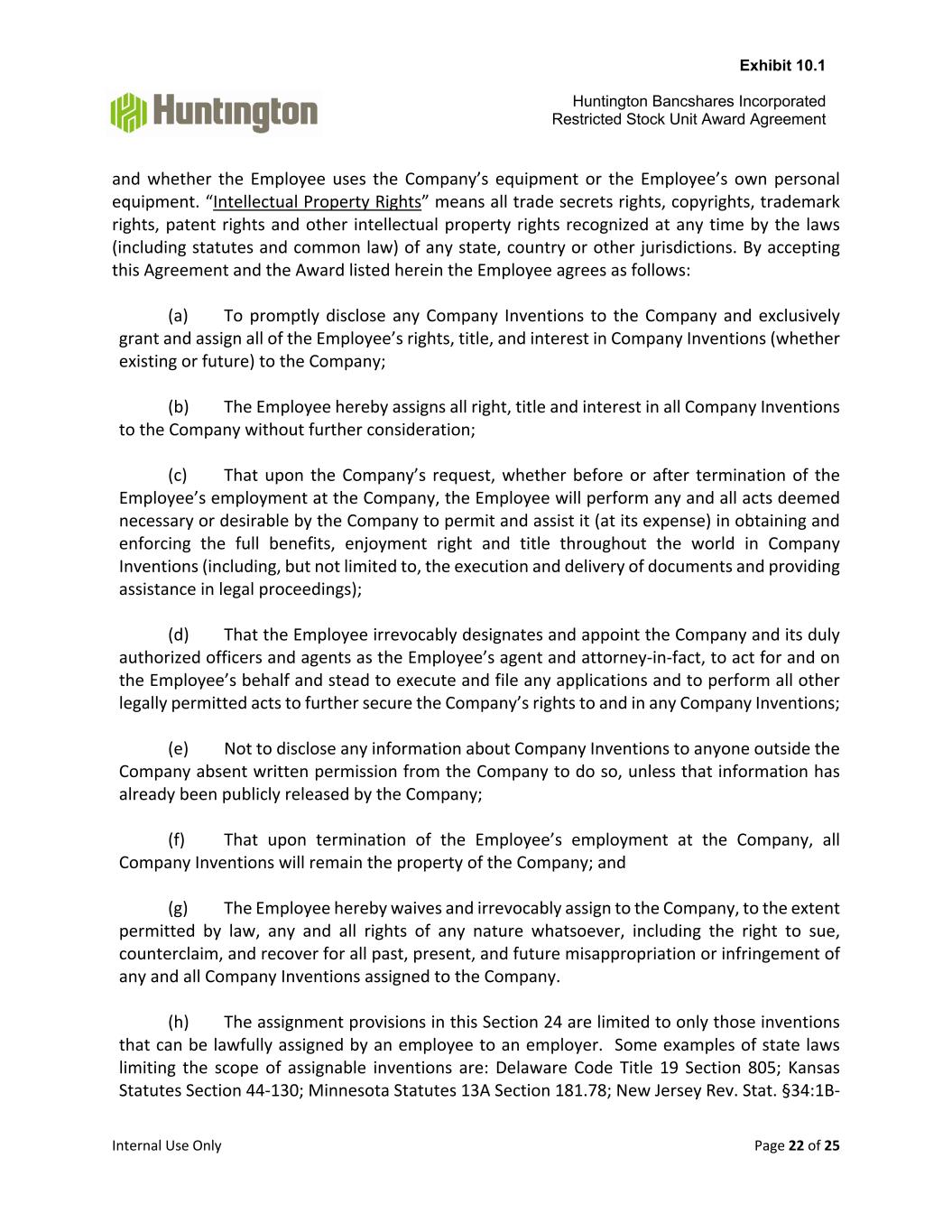
Exhibit 10.1 Huntington Bancshares Incorporated Restricted Stock Unit Award Agreement Internal Use Only Page 22 of 25 and whether the Employee uses the Company’s equipment or the Employee’s own personal equipment. “Intellectual Property Rights” means all trade secrets rights, copyrights, trademark rights, patent rights and other intellectual property rights recognized at any time by the laws (including statutes and common law) of any state, country or other jurisdictions. By accepting this Agreement and the Award listed herein the Employee agrees as follows: (a) To promptly disclose any Company Inventions to the Company and exclusively grant and assign all of the Employee’s rights, title, and interest in Company Inventions (whether existing or future) to the Company; (b) The Employee hereby assigns all right, title and interest in all Company Inventions to the Company without further consideration; (c) That upon the Company’s request, whether before or after termination of the Employee’s employment at the Company, the Employee will perform any and all acts deemed necessary or desirable by the Company to permit and assist it (at its expense) in obtaining and enforcing the full benefits, enjoyment right and title throughout the world in Company Inventions (including, but not limited to, the execution and delivery of documents and providing assistance in legal proceedings); (d) That the Employee irrevocably designates and appoint the Company and its duly authorized officers and agents as the Employee’s agent and attorney‐in‐fact, to act for and on the Employee’s behalf and stead to execute and file any applications and to perform all other legally permitted acts to further secure the Company’s rights to and in any Company Inventions; (e) Not to disclose any information about Company Inventions to anyone outside the Company absent written permission from the Company to do so, unless that information has already been publicly released by the Company; (f) That upon termination of the Employee’s employment at the Company, all Company Inventions will remain the property of the Company; and (g) The Employee hereby waives and irrevocably assign to the Company, to the extent permitted by law, any and all rights of any nature whatsoever, including the right to sue, counterclaim, and recover for all past, present, and future misappropriation or infringement of any and all Company Inventions assigned to the Company. (h) The assignment provisions in this Section 24 are limited to only those inventions that can be lawfully assigned by an employee to an employer. Some examples of state laws limiting the scope of assignable inventions are: Delaware Code Title 19 Section 805; Kansas Statutes Section 44‐130; Minnesota Statutes 13A Section 181.78; New Jersey Rev. Stat. §34:1B‐
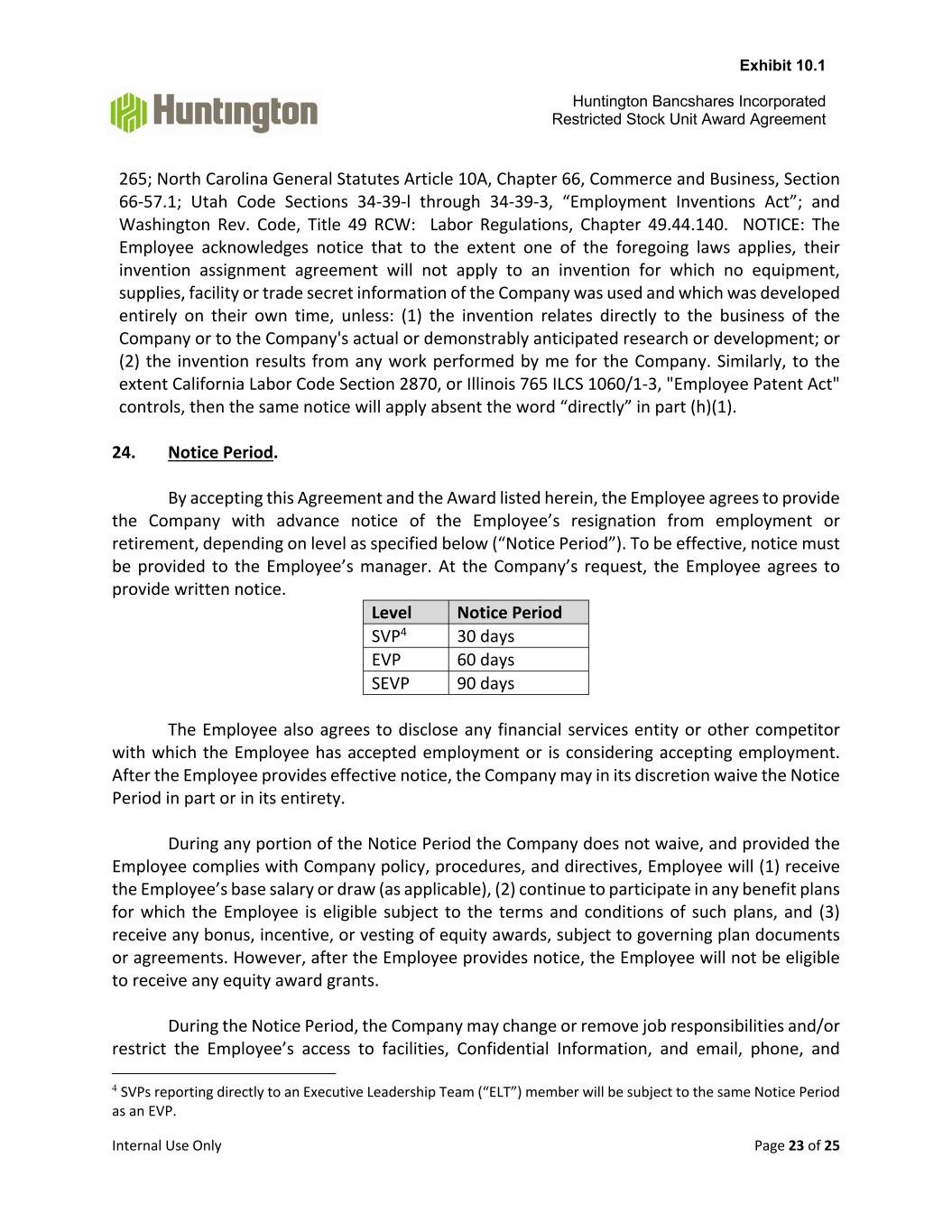
Exhibit 10.1 Huntington Bancshares Incorporated Restricted Stock Unit Award Agreement Internal Use Only Page 23 of 25 265; North Carolina General Statutes Article 10A, Chapter 66, Commerce and Business, Section 66‐57.1; Utah Code Sections 34‐39‐l through 34‐39‐3, “Employment Inventions Act”; and Washington Rev. Code, Title 49 RCW: Labor Regulations, Chapter 49.44.140. NOTICE: The Employee acknowledges notice that to the extent one of the foregoing laws applies, their invention assignment agreement will not apply to an invention for which no equipment, supplies, facility or trade secret information of the Company was used and which was developed entirely on their own time, unless: (1) the invention relates directly to the business of the Company or to the Company's actual or demonstrably anticipated research or development; or (2) the invention results from any work performed by me for the Company. Similarly, to the extent California Labor Code Section 2870, or Illinois 765 ILCS 1060/1‐3, "Employee Patent Act" controls, then the same notice will apply absent the word “directly” in part (h)(1). 24. Notice Period. By accepting this Agreement and the Award listed herein, the Employee agrees to provide the Company with advance notice of the Employee’s resignation from employment or retirement, depending on level as specified below (“Notice Period”). To be effective, notice must be provided to the Employee’s manager. At the Company’s request, the Employee agrees to provide written notice. Level Notice Period SVP4 30 days EVP 60 days SEVP 90 days The Employee also agrees to disclose any financial services entity or other competitor with which the Employee has accepted employment or is considering accepting employment. After the Employee provides effective notice, the Company may in its discretion waive the Notice Period in part or in its entirety. During any portion of the Notice Period the Company does not waive, and provided the Employee complies with Company policy, procedures, and directives, Employee will (1) receive the Employee’s base salary or draw (as applicable), (2) continue to participate in any benefit plans for which the Employee is eligible subject to the terms and conditions of such plans, and (3) receive any bonus, incentive, or vesting of equity awards, subject to governing plan documents or agreements. However, after the Employee provides notice, the Employee will not be eligible to receive any equity award grants. During the Notice Period, the Company may change or remove job responsibilities and/or restrict the Employee’s access to facilities, Confidential Information, and email, phone, and 4 SVPs reporting directly to an Executive Leadership Team (“ELT”) member will be subject to the same Notice Period as an EVP.
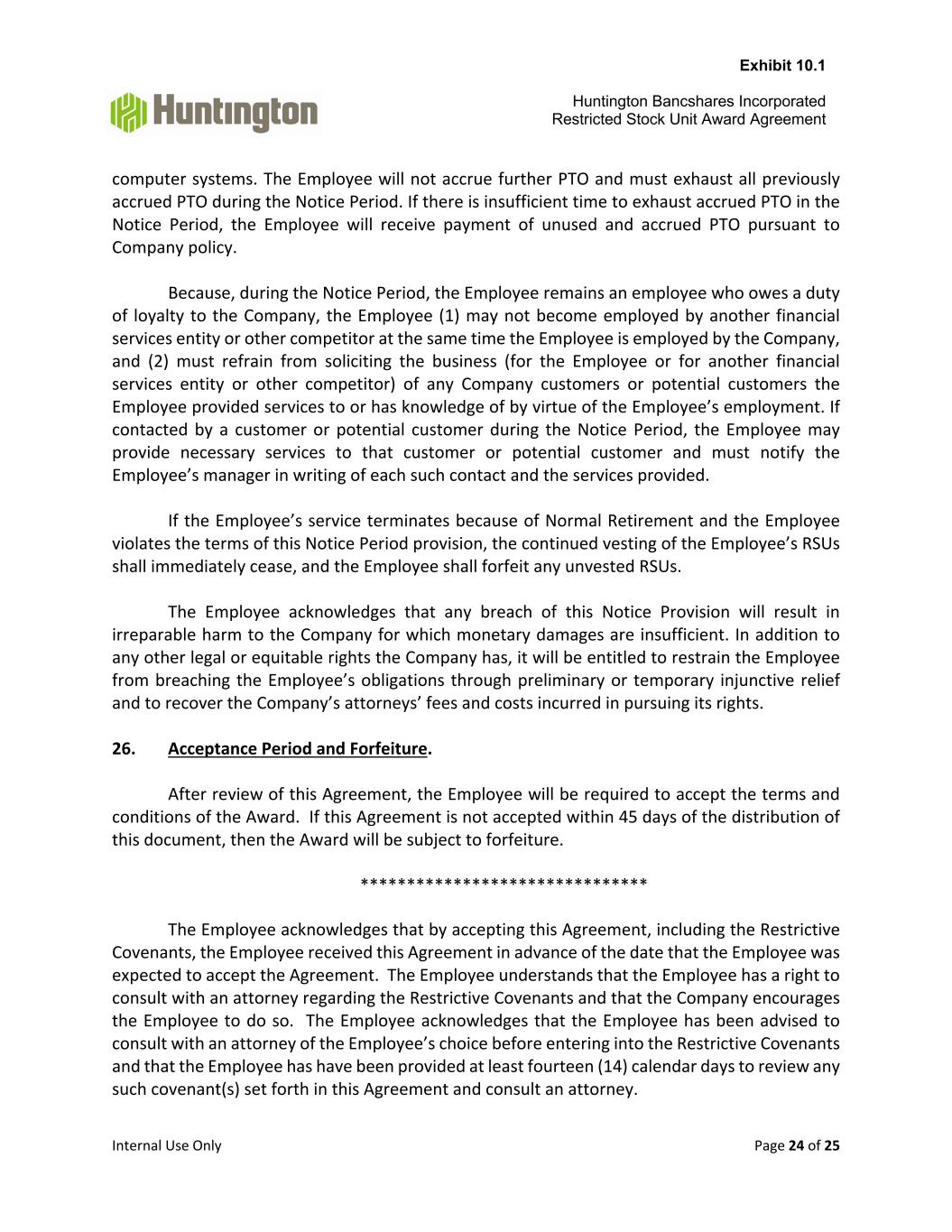
Exhibit 10.1 Huntington Bancshares Incorporated Restricted Stock Unit Award Agreement Internal Use Only Page 24 of 25 computer systems. The Employee will not accrue further PTO and must exhaust all previously accrued PTO during the Notice Period. If there is insufficient time to exhaust accrued PTO in the Notice Period, the Employee will receive payment of unused and accrued PTO pursuant to Company policy. Because, during the Notice Period, the Employee remains an employee who owes a duty of loyalty to the Company, the Employee (1) may not become employed by another financial services entity or other competitor at the same time the Employee is employed by the Company, and (2) must refrain from soliciting the business (for the Employee or for another financial services entity or other competitor) of any Company customers or potential customers the Employee provided services to or has knowledge of by virtue of the Employee’s employment. If contacted by a customer or potential customer during the Notice Period, the Employee may provide necessary services to that customer or potential customer and must notify the Employee’s manager in writing of each such contact and the services provided. If the Employee’s service terminates because of Normal Retirement and the Employee violates the terms of this Notice Period provision, the continued vesting of the Employee’s RSUs shall immediately cease, and the Employee shall forfeit any unvested RSUs. The Employee acknowledges that any breach of this Notice Provision will result in irreparable harm to the Company for which monetary damages are insufficient. In addition to any other legal or equitable rights the Company has, it will be entitled to restrain the Employee from breaching the Employee’s obligations through preliminary or temporary injunctive relief and to recover the Company’s attorneys’ fees and costs incurred in pursuing its rights. 26. Acceptance Period and Forfeiture. After review of this Agreement, the Employee will be required to accept the terms and conditions of the Award. If this Agreement is not accepted within 45 days of the distribution of this document, then the Award will be subject to forfeiture. ******************************* The Employee acknowledges that by accepting this Agreement, including the Restrictive Covenants, the Employee received this Agreement in advance of the date that the Employee was expected to accept the Agreement. The Employee understands that the Employee has a right to consult with an attorney regarding the Restrictive Covenants and that the Company encourages the Employee to do so. The Employee acknowledges that the Employee has been advised to consult with an attorney of the Employee’s choice before entering into the Restrictive Covenants and that the Employee has have been provided at least fourteen (14) calendar days to review any such covenant(s) set forth in this Agreement and consult an attorney.
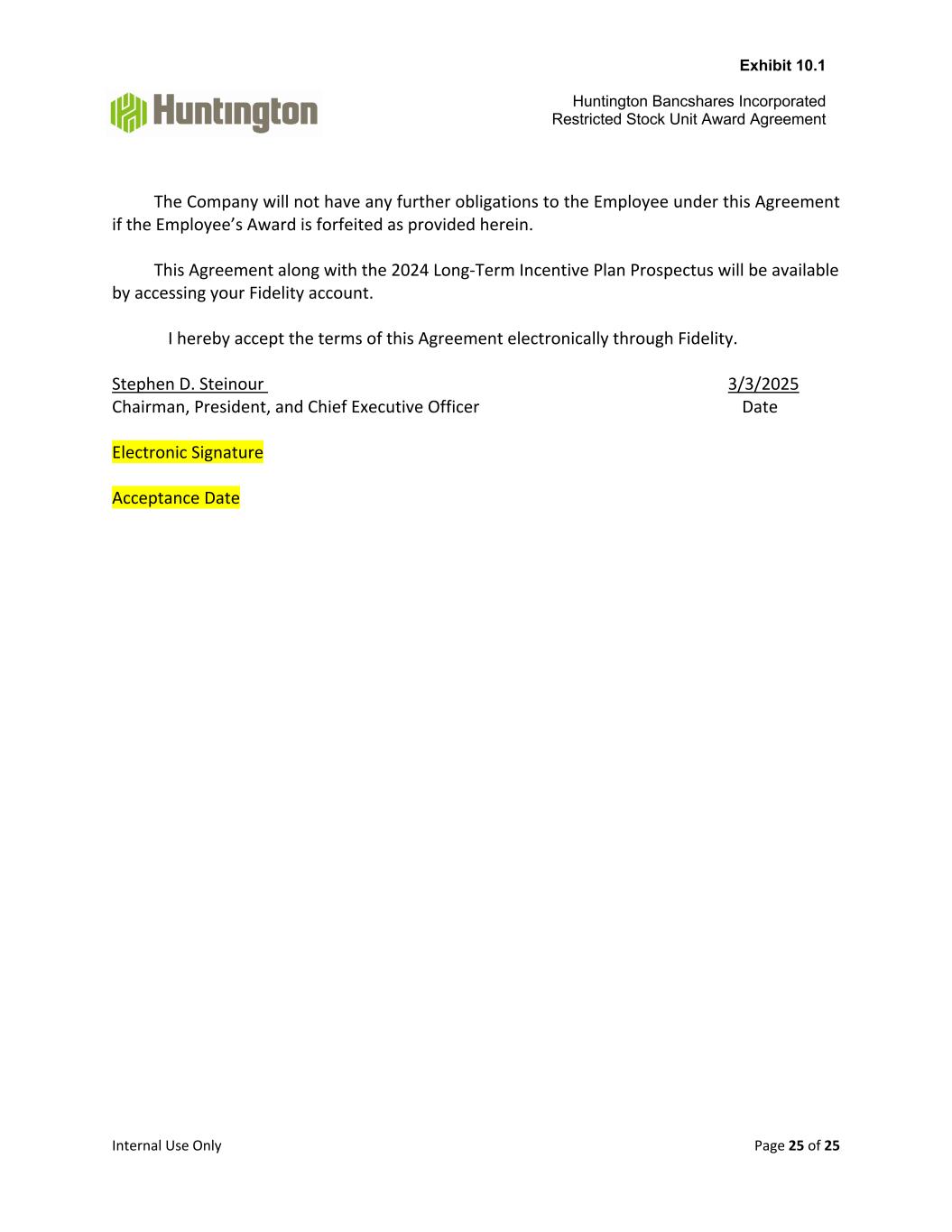
Exhibit 10.1 Huntington Bancshares Incorporated Restricted Stock Unit Award Agreement Internal Use Only Page 25 of 25 The Company will not have any further obligations to the Employee under this Agreement if the Employee’s Award is forfeited as provided herein. This Agreement along with the 2024 Long‐Term Incentive Plan Prospectus will be available by accessing your Fidelity account. I hereby accept the terms of this Agreement electronically through Fidelity. Stephen D. Steinour 3/3/2025 Chairman, President, and Chief Executive Officer Date Electronic Signature Acceptance Date